Photos: Phil Butland, Paul Grasse, Regina Sternal, Trad (@illustradtion)
Because of the current level of repression in Berlin against Palestinians and their supporters, most faces have been pixellated.
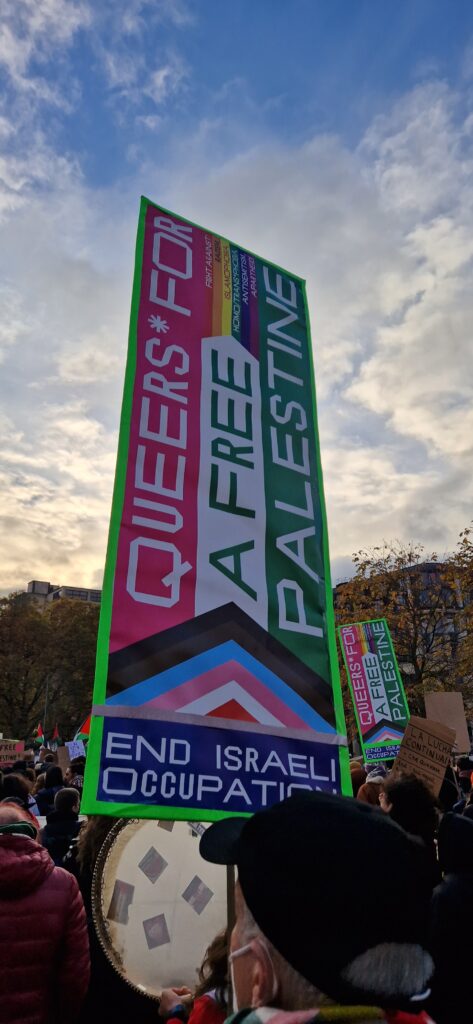
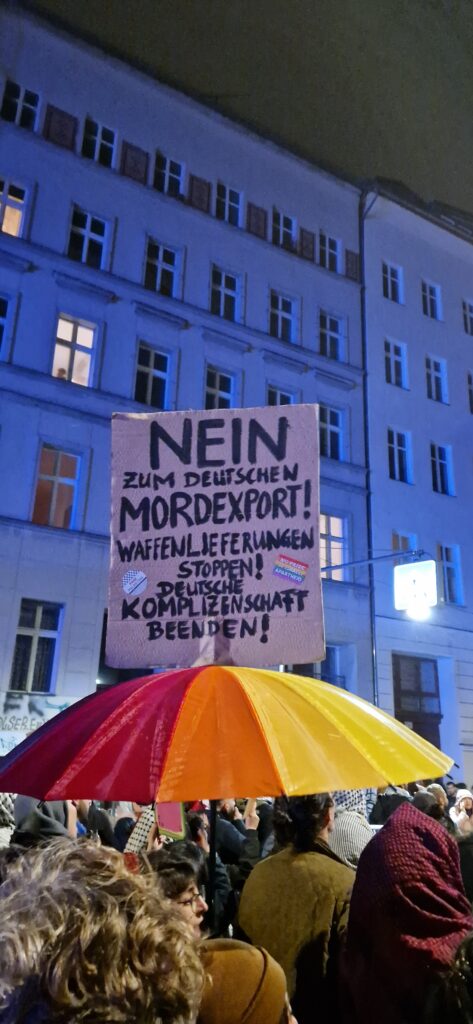
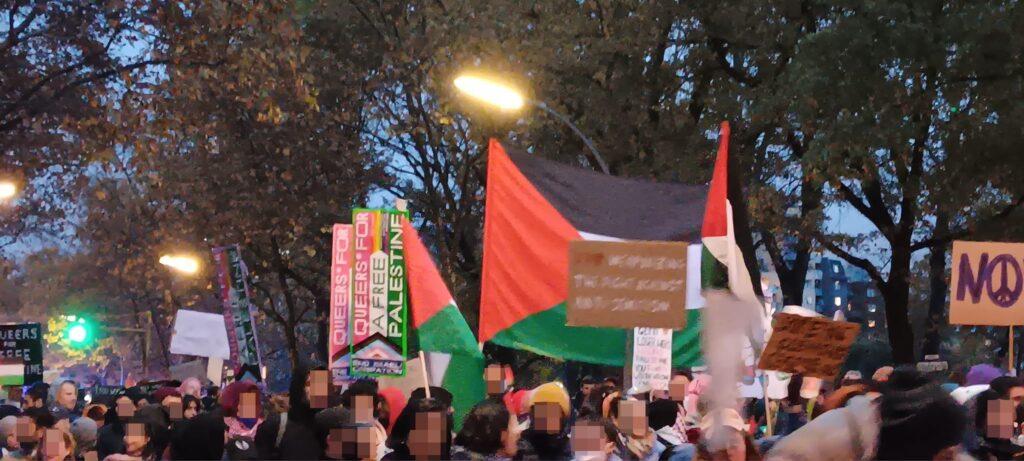
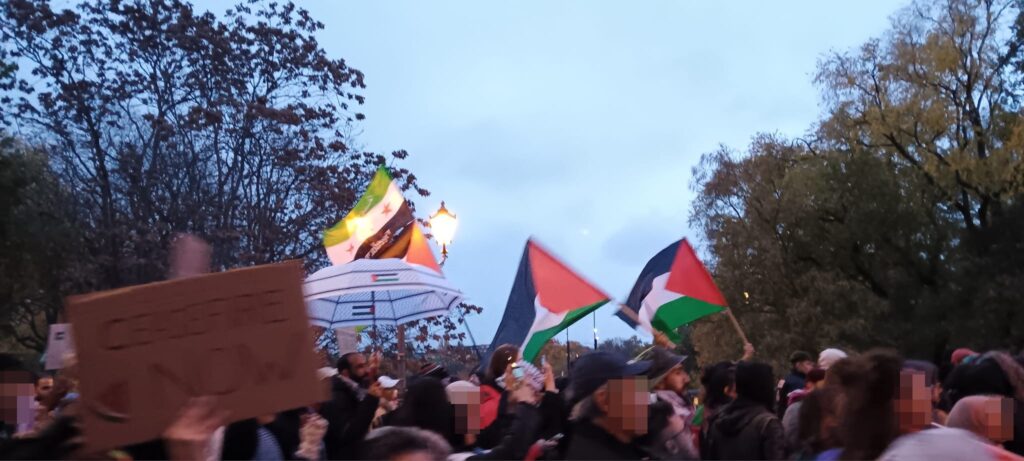
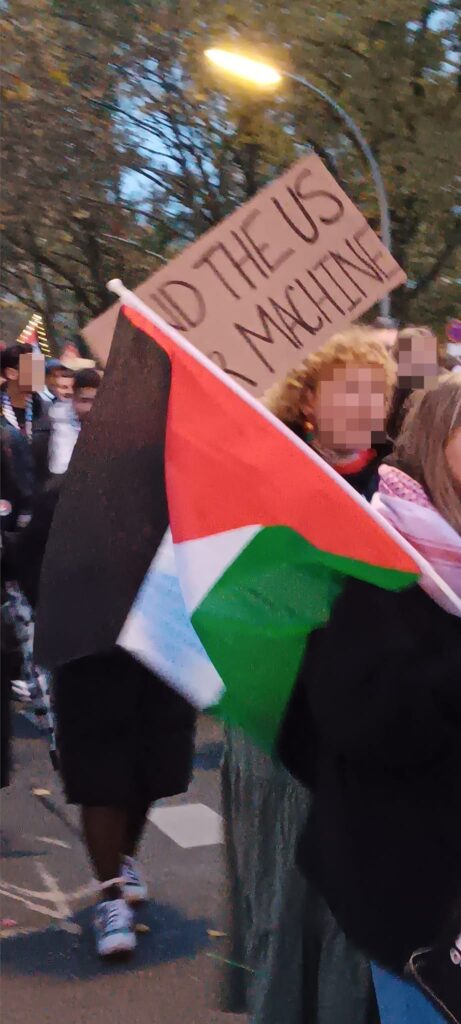
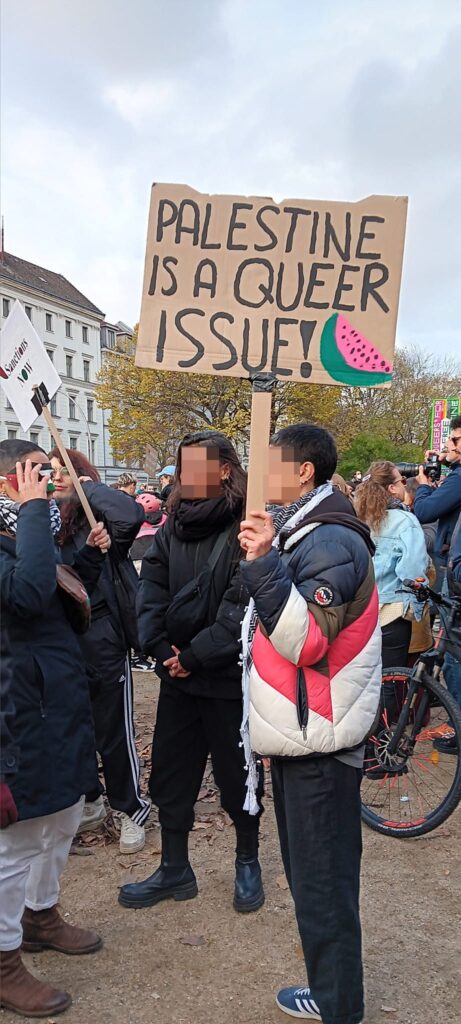
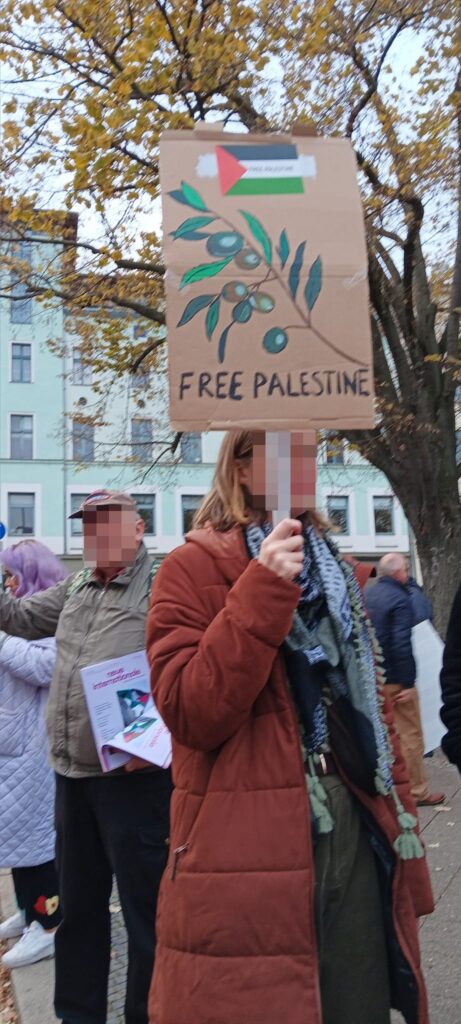
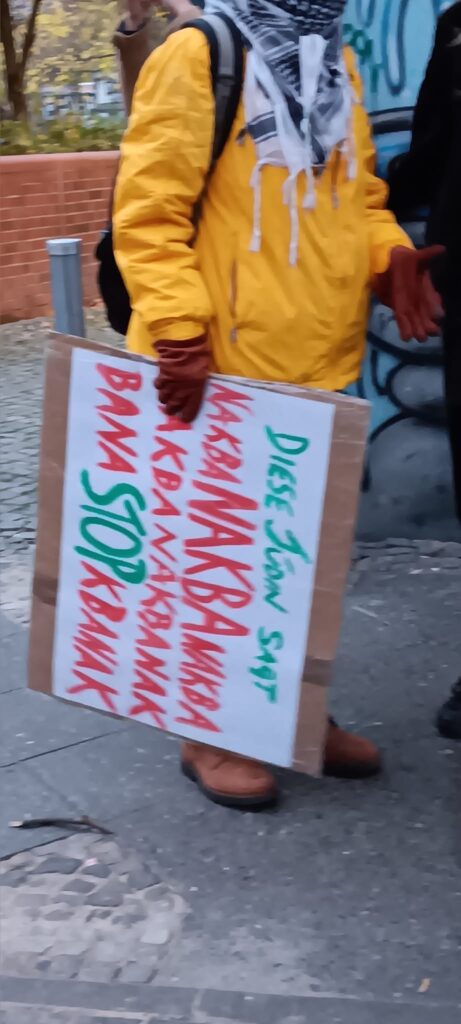
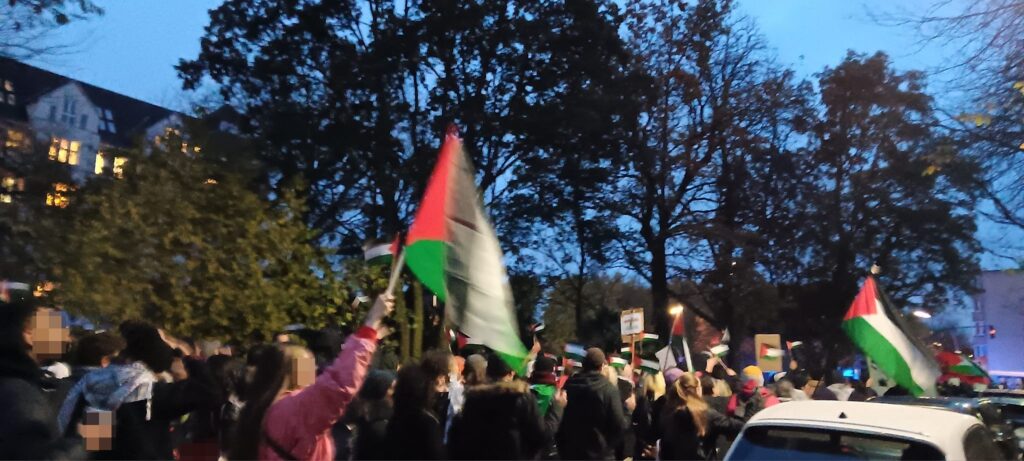
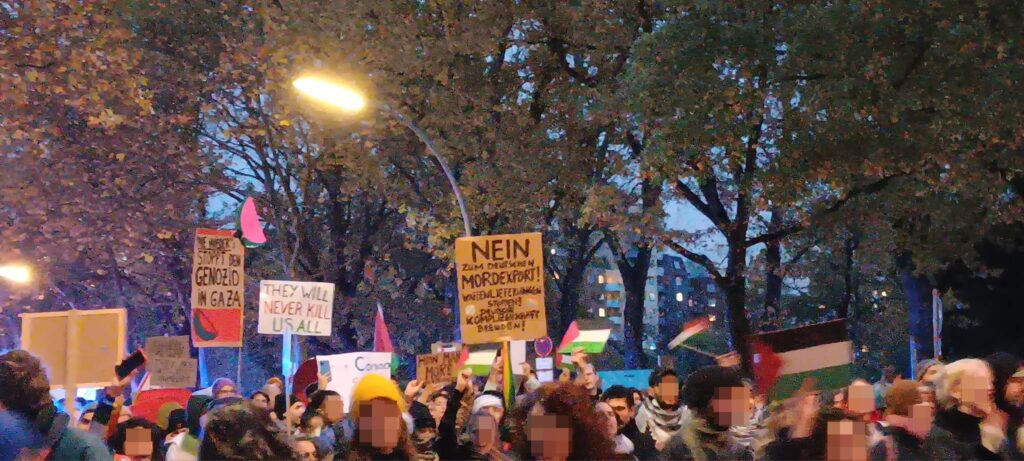
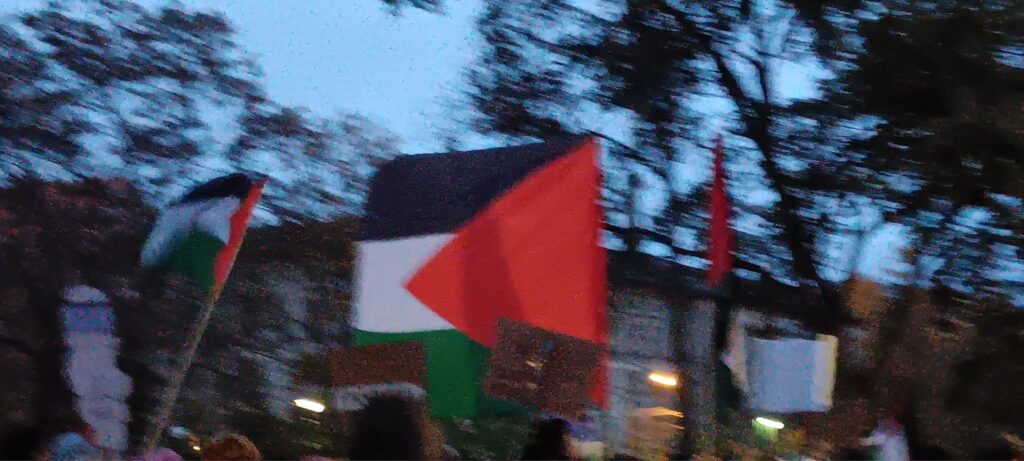
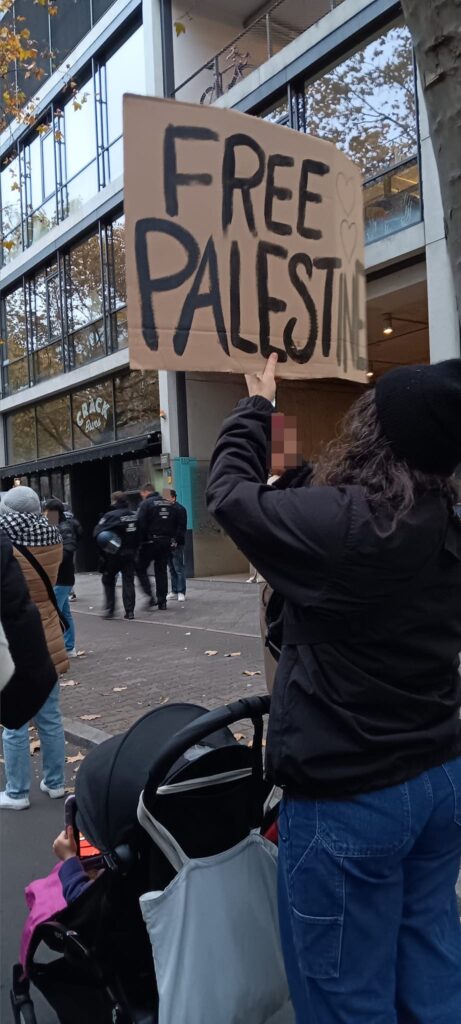
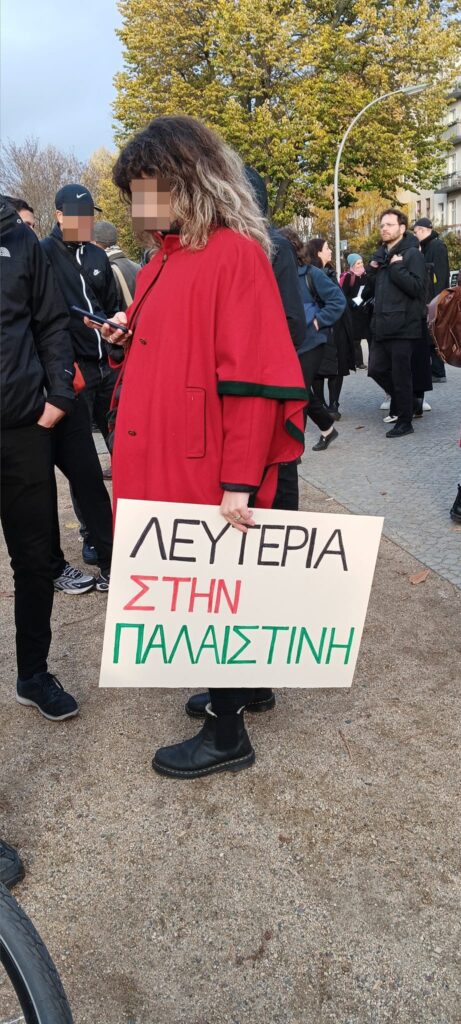
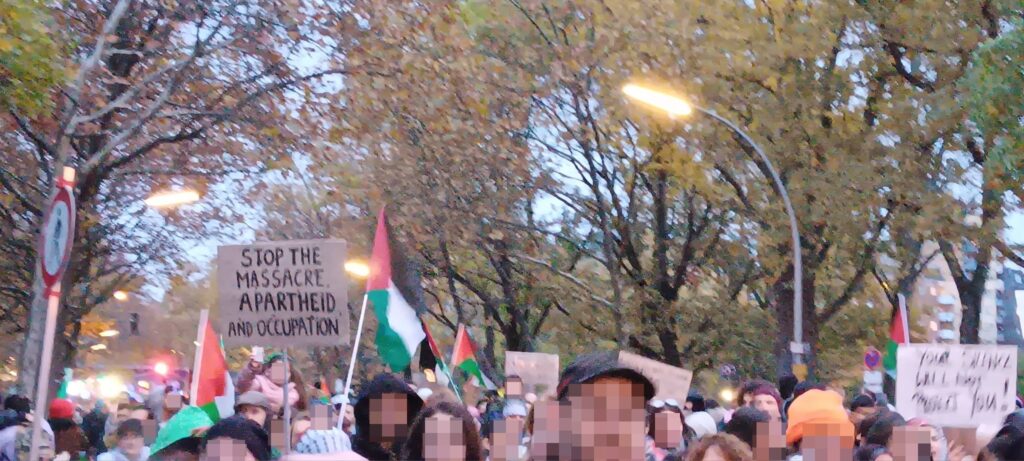
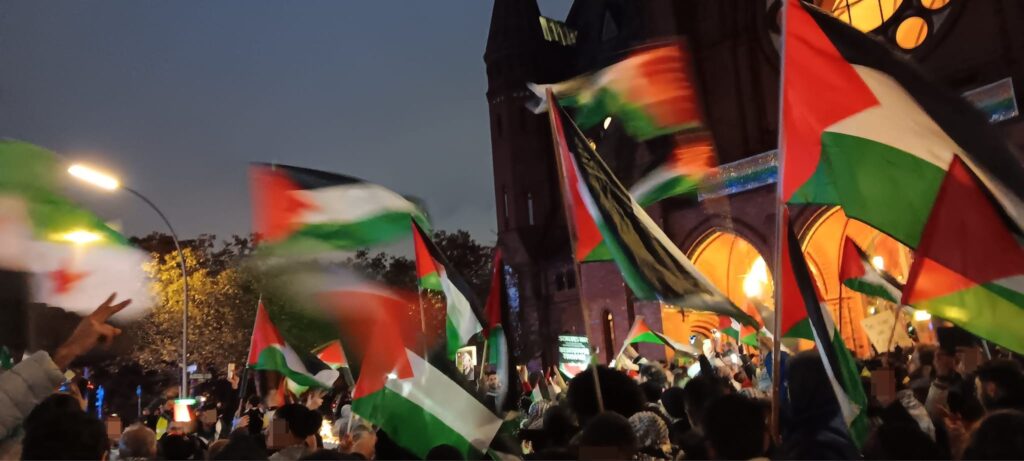
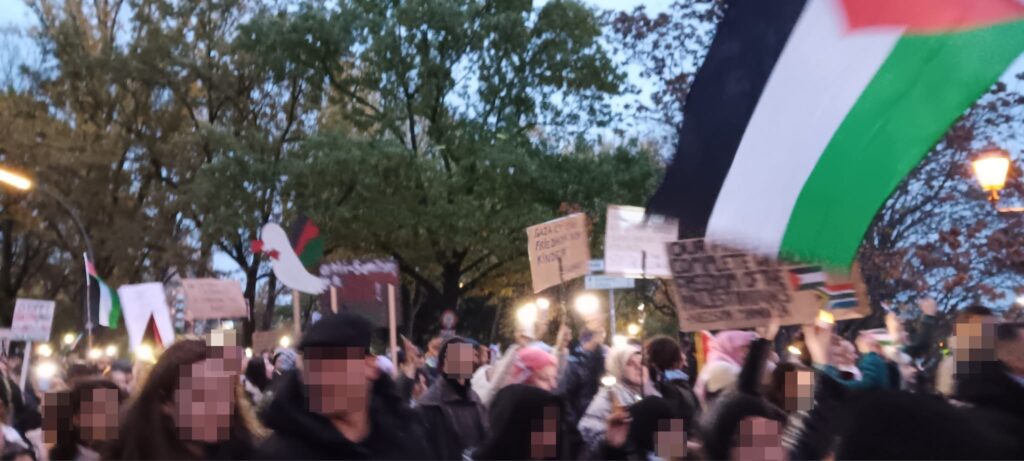
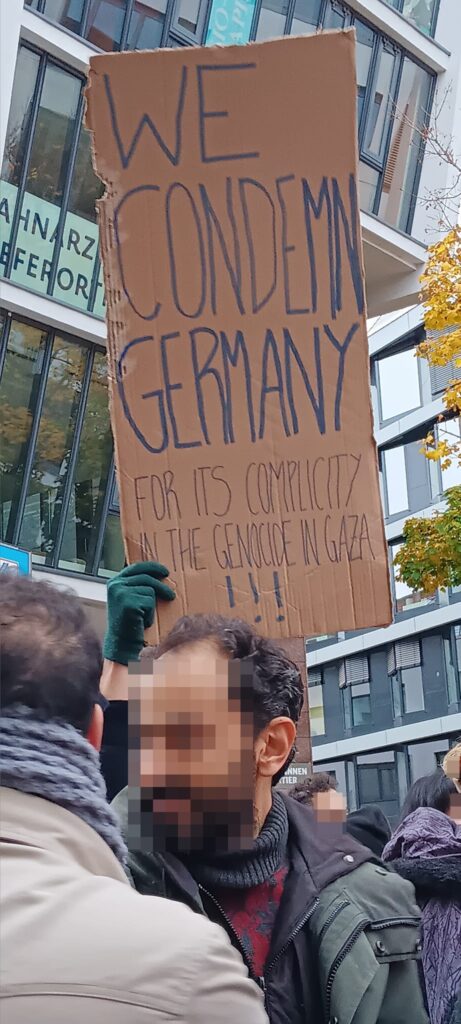
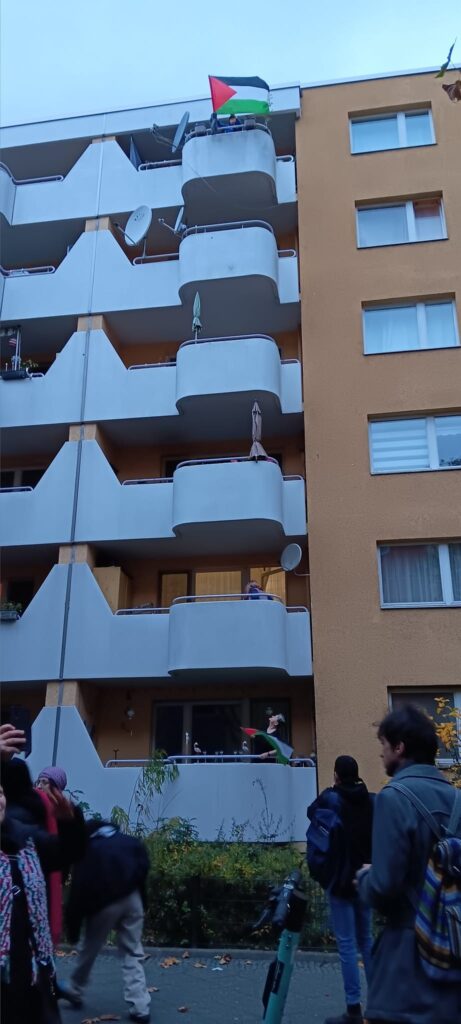
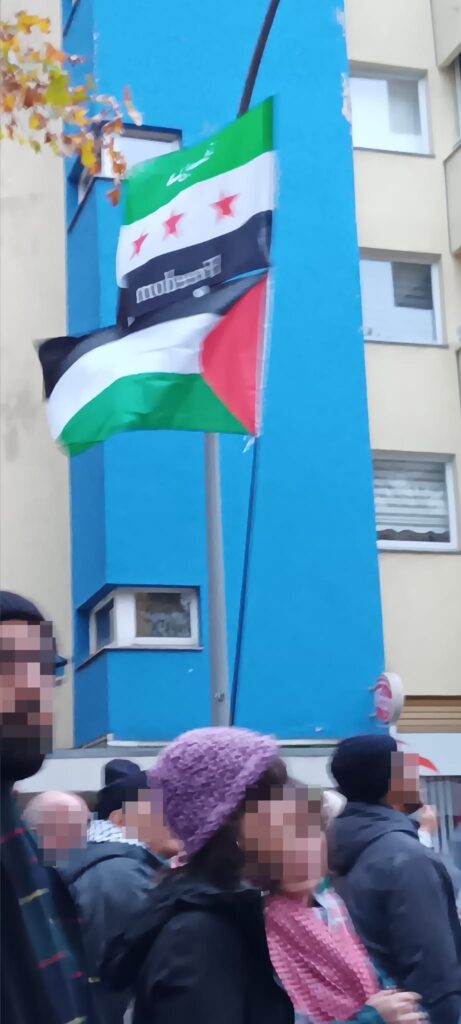
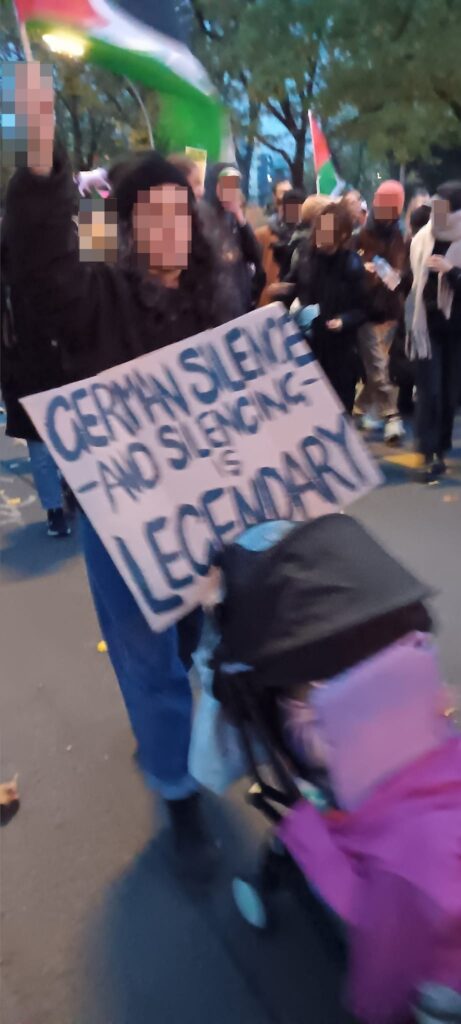
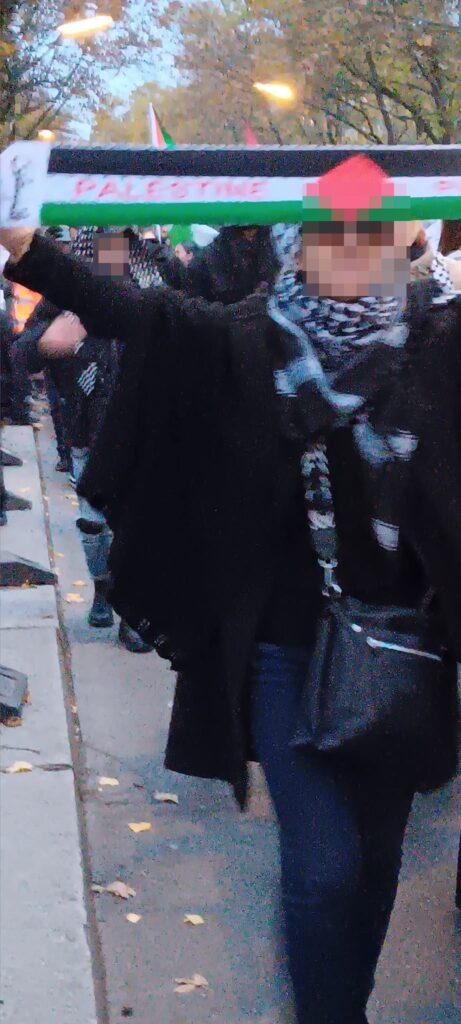
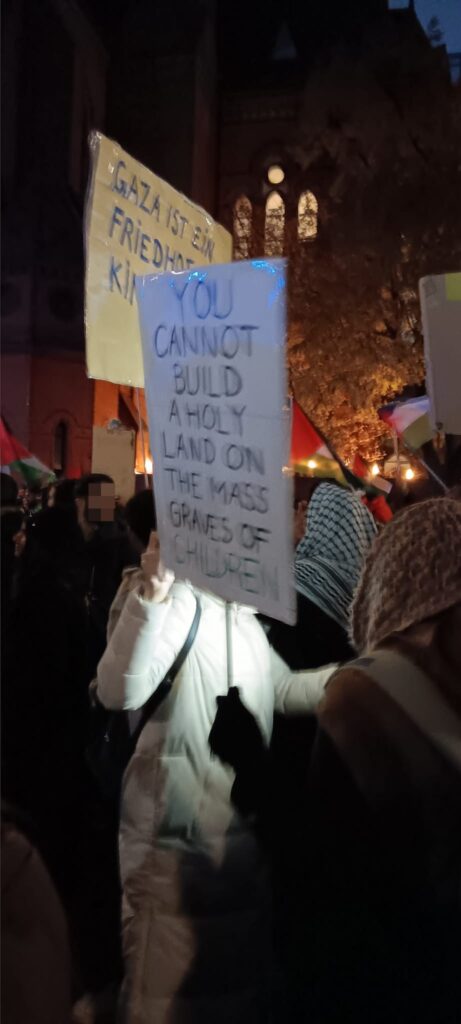
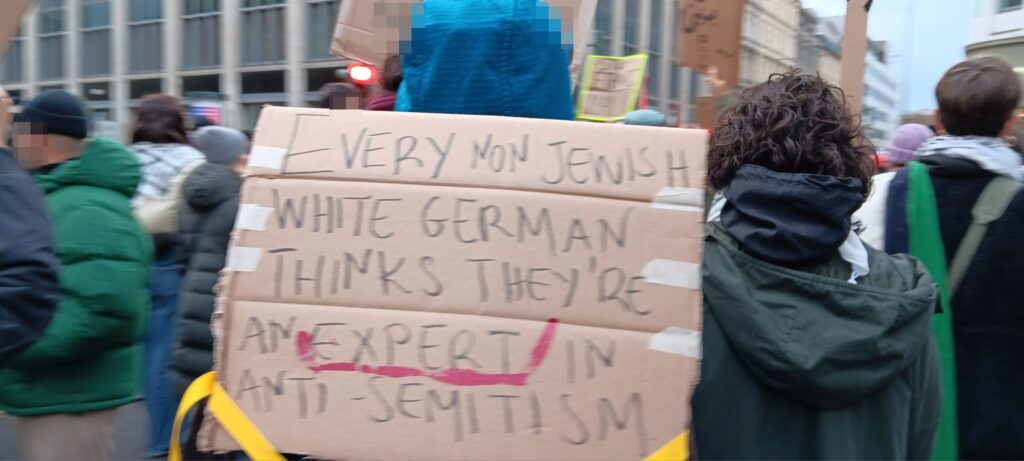
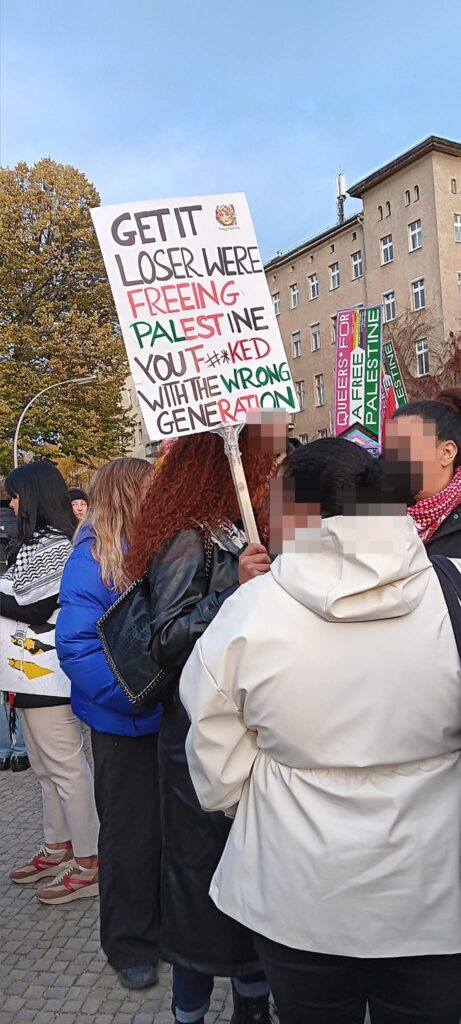
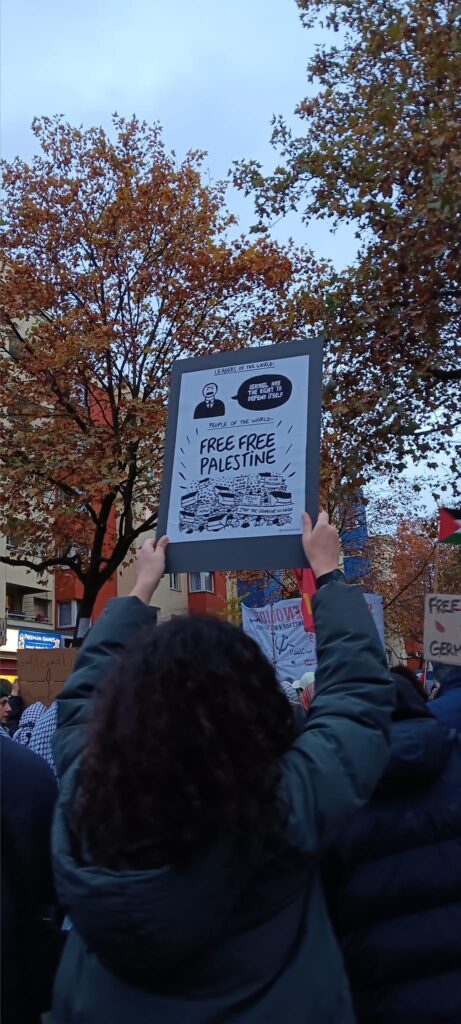
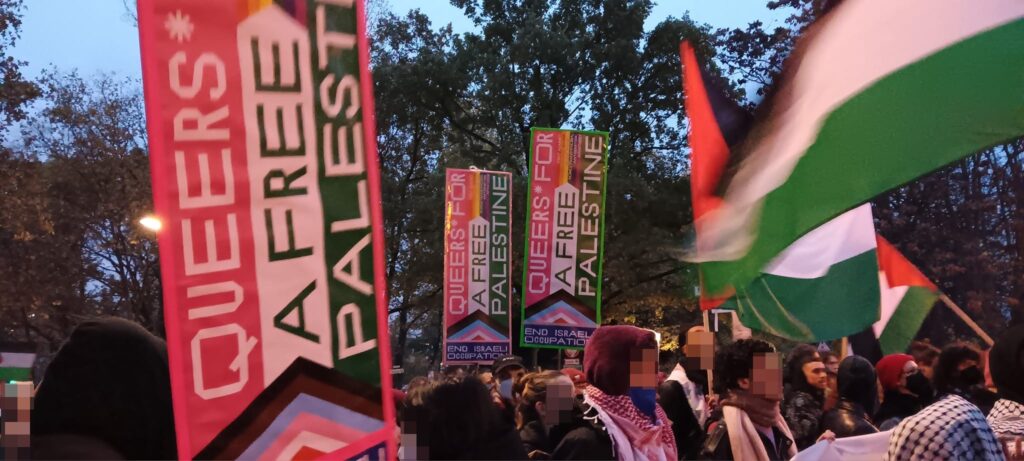
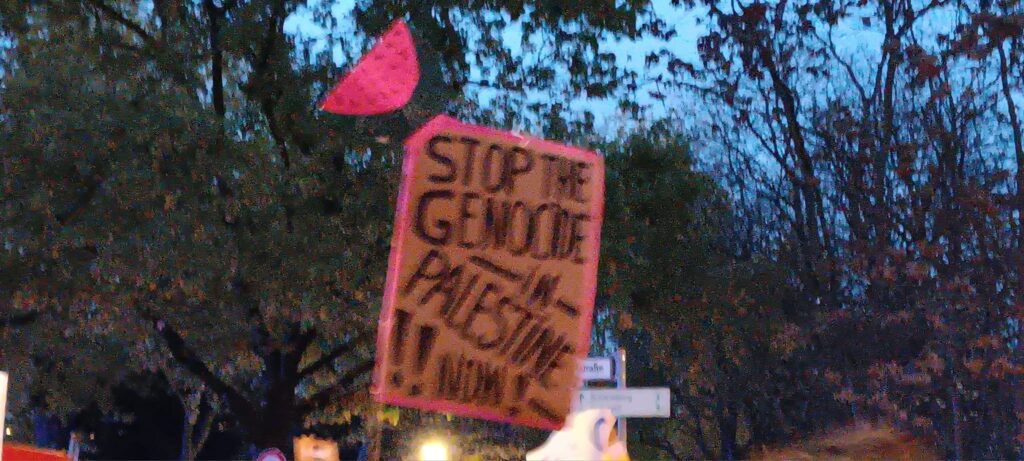
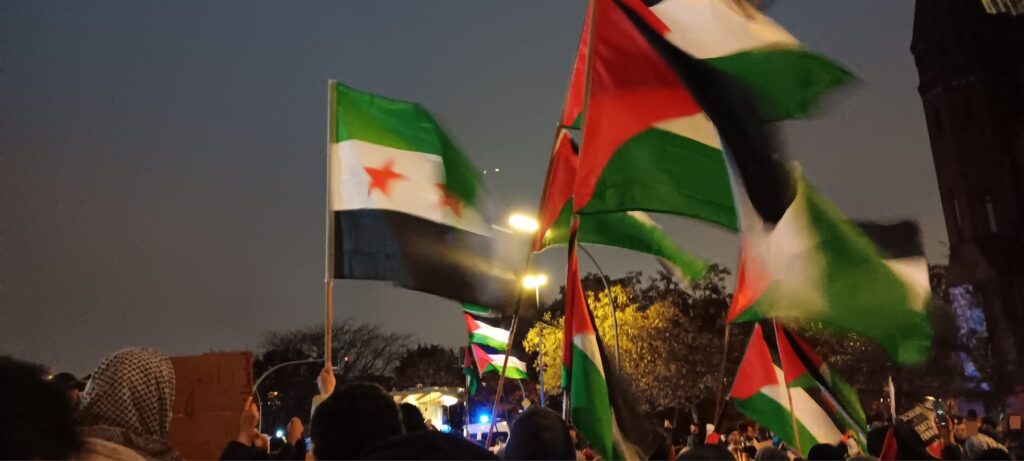
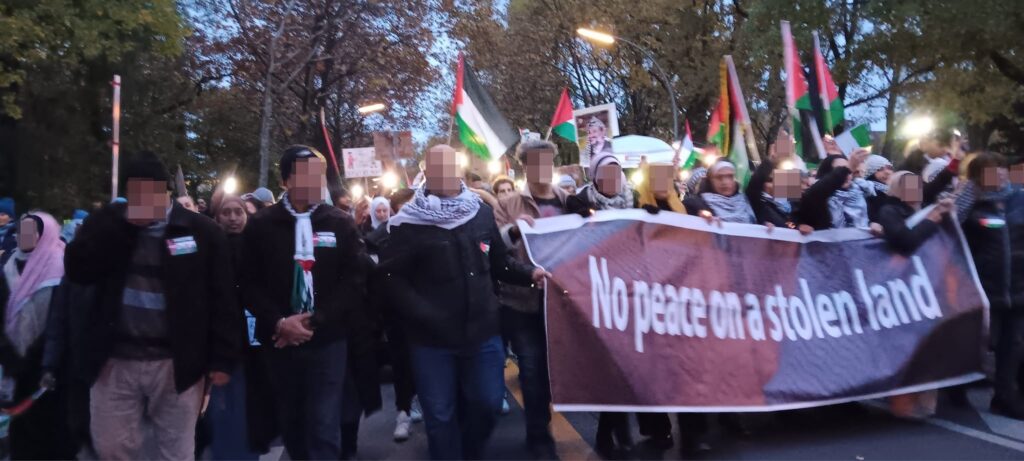
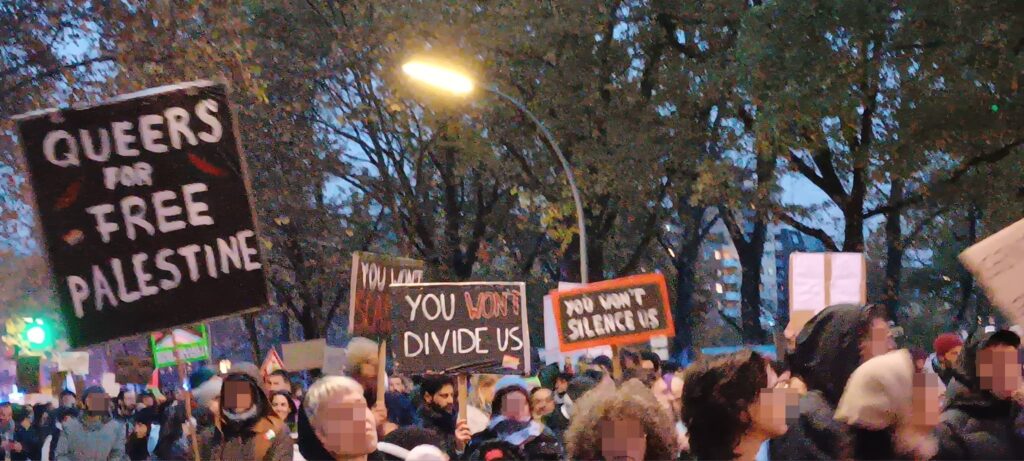
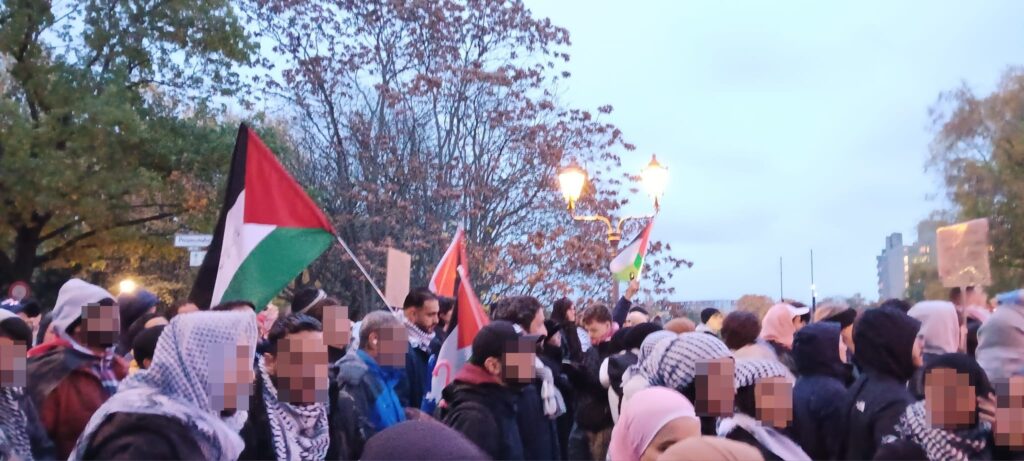
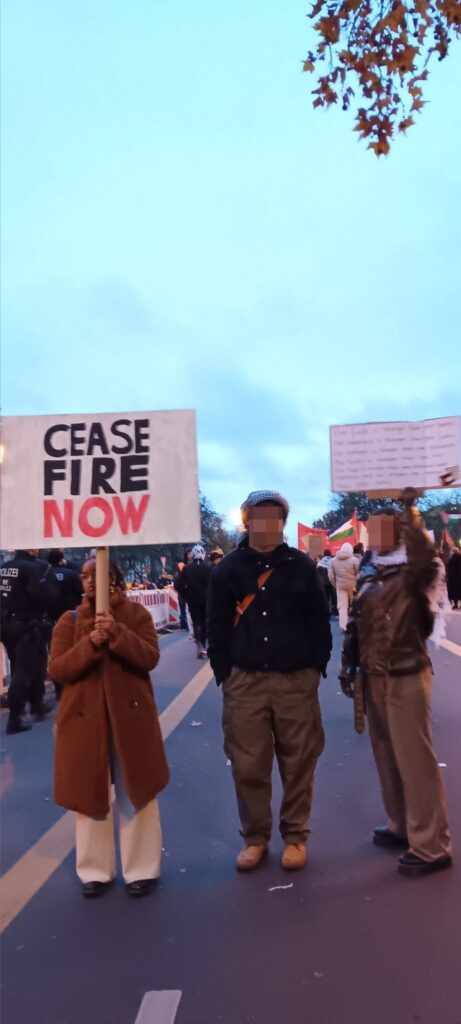
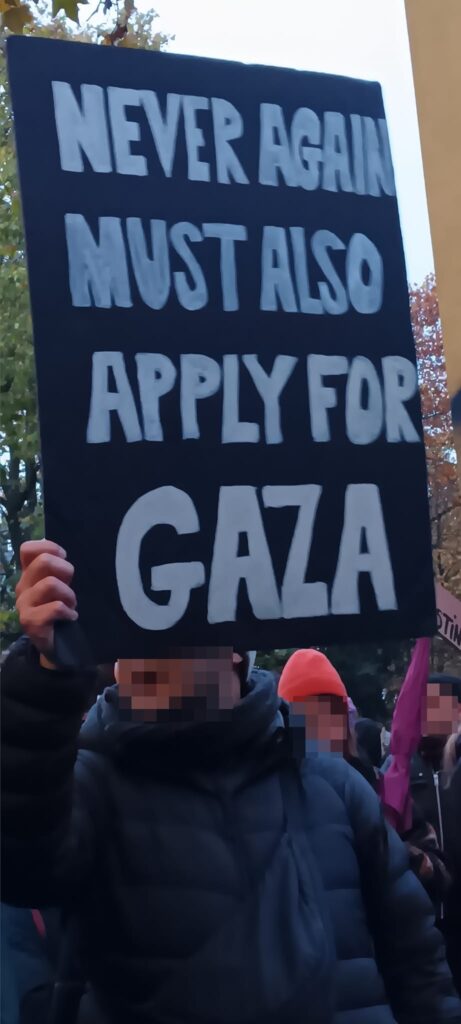
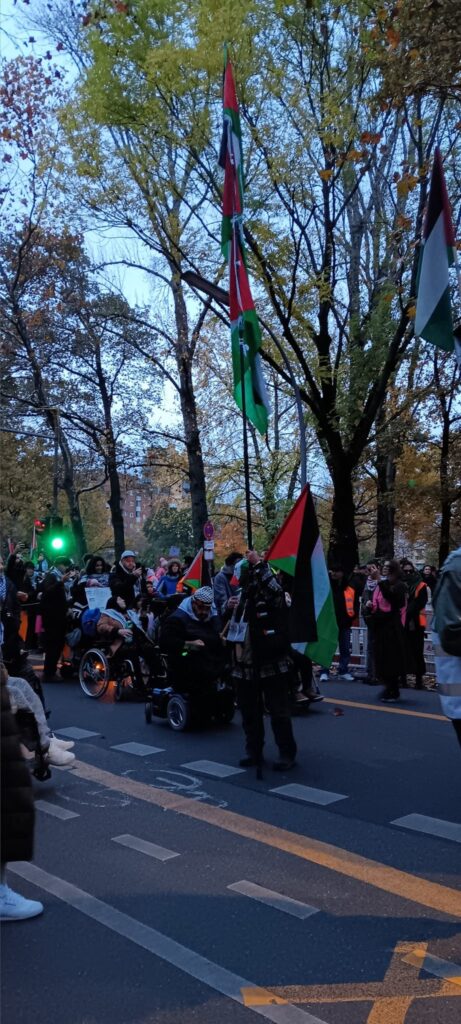
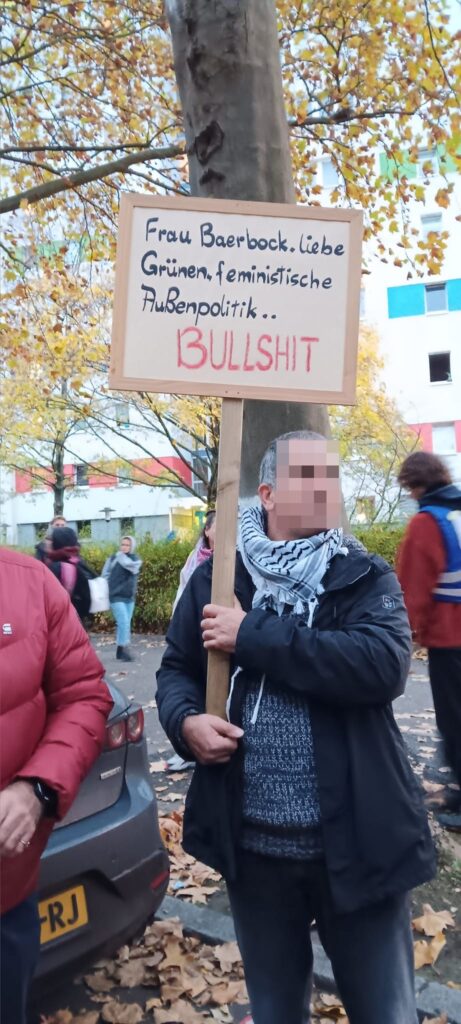
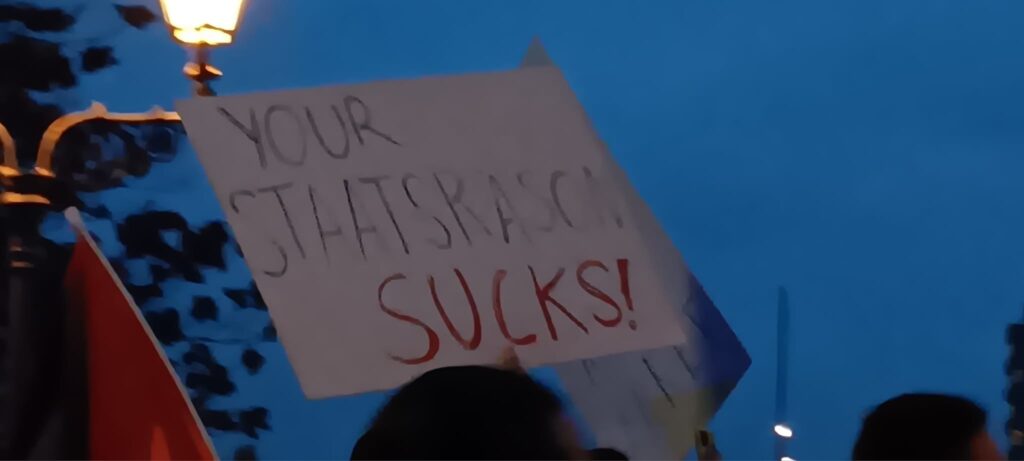
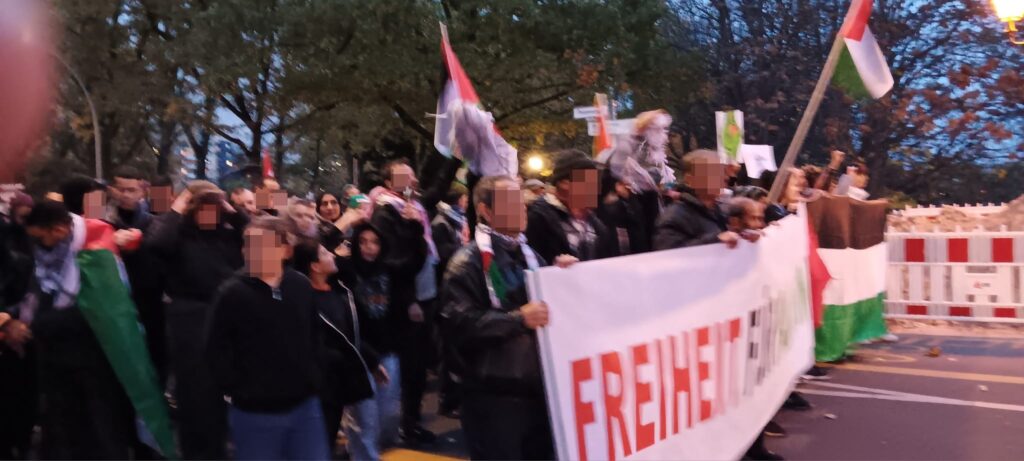
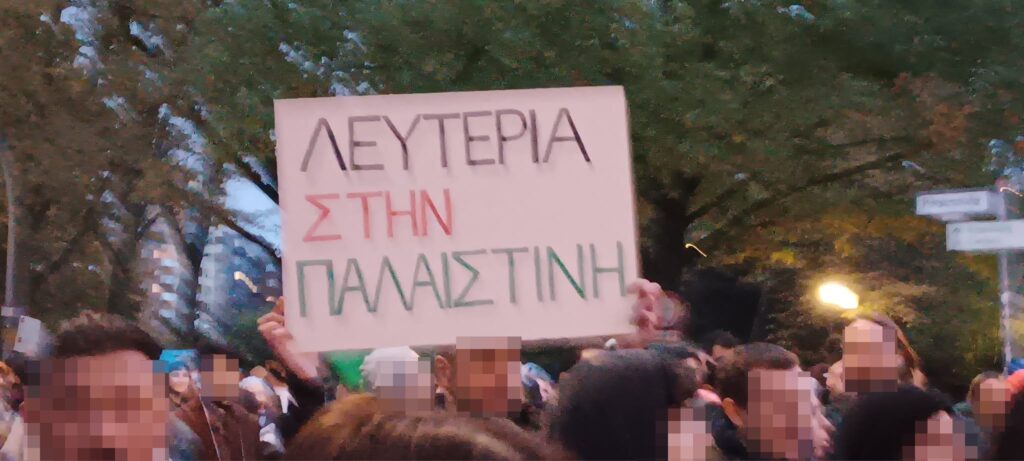
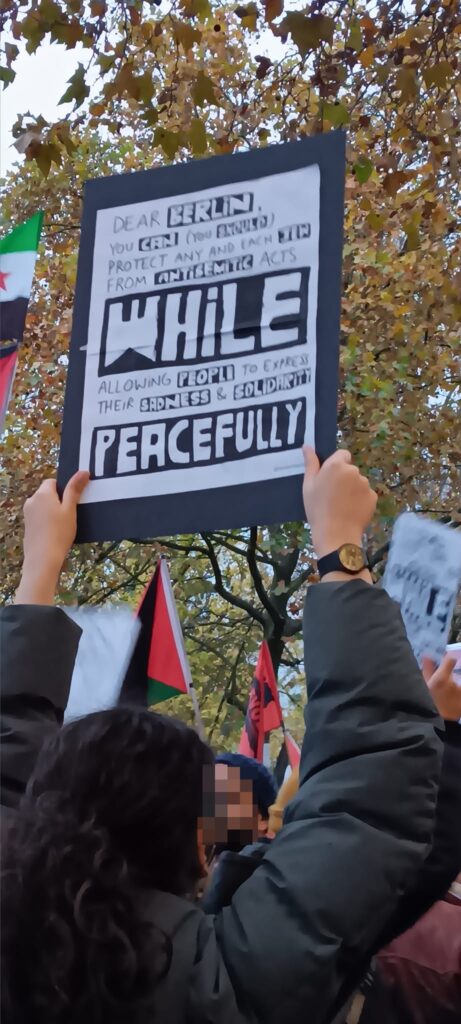
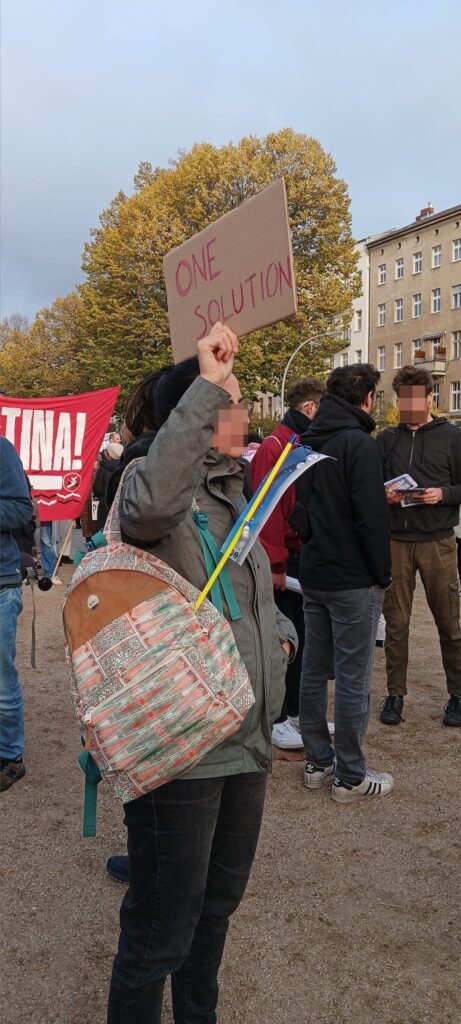
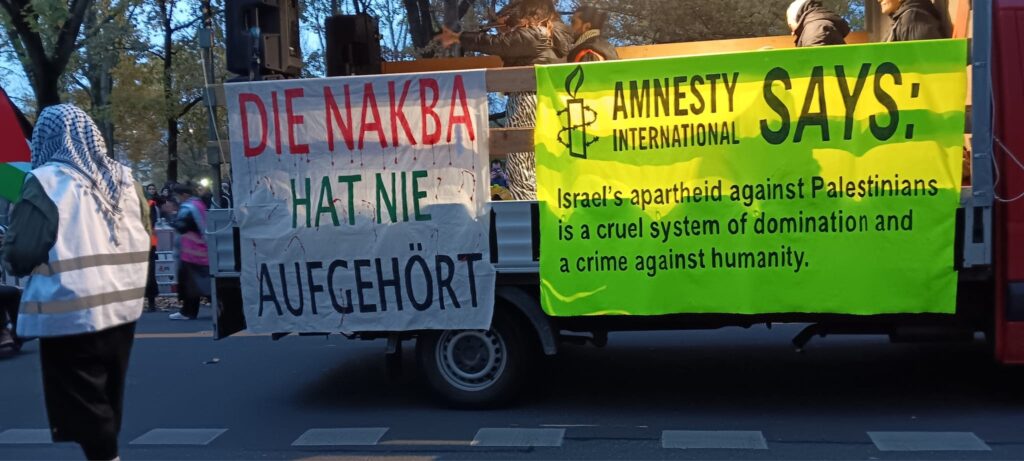
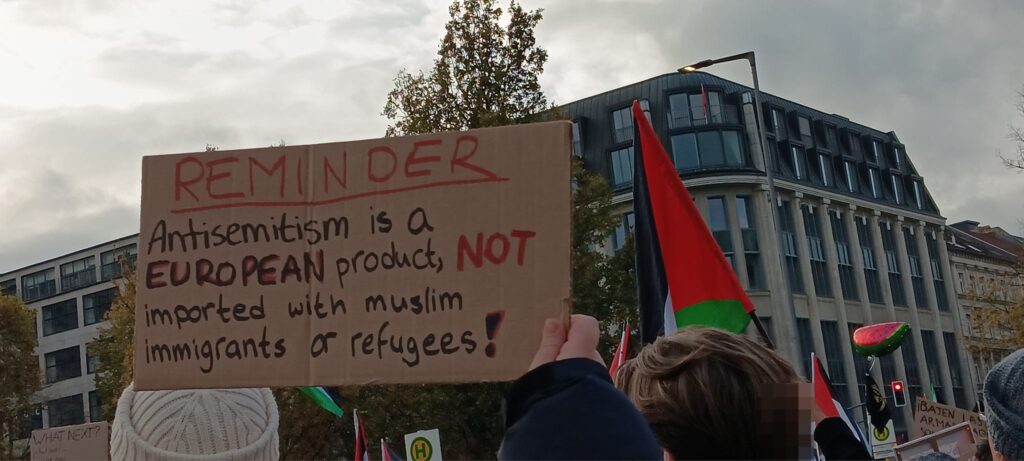
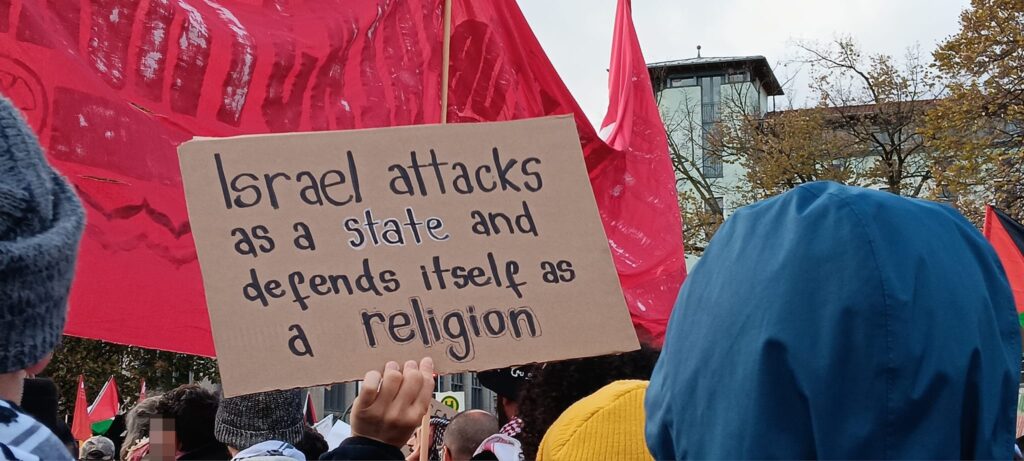
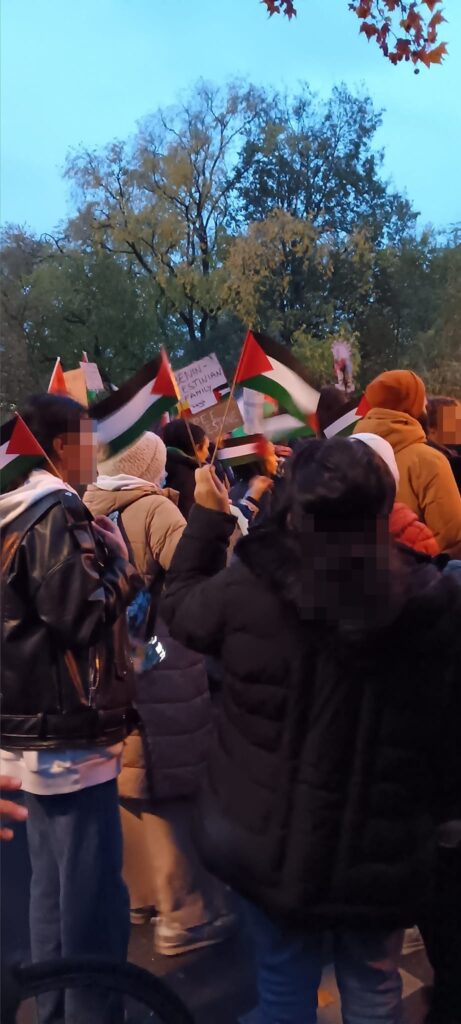
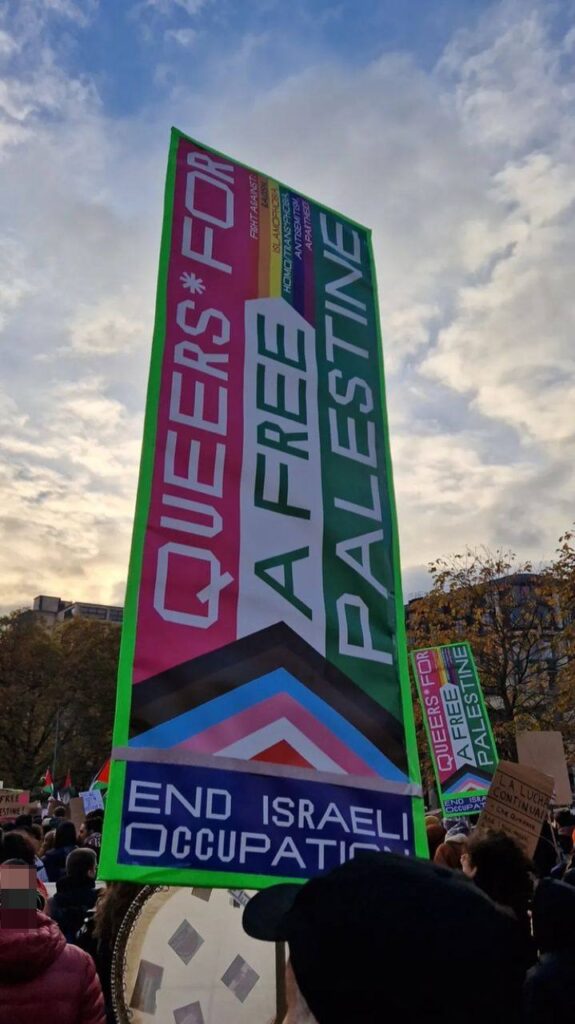
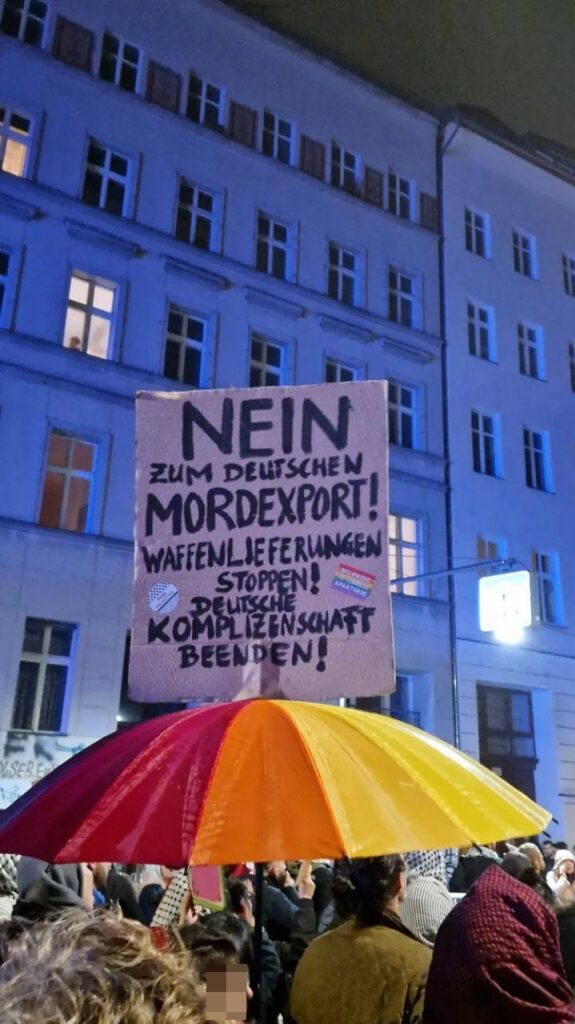
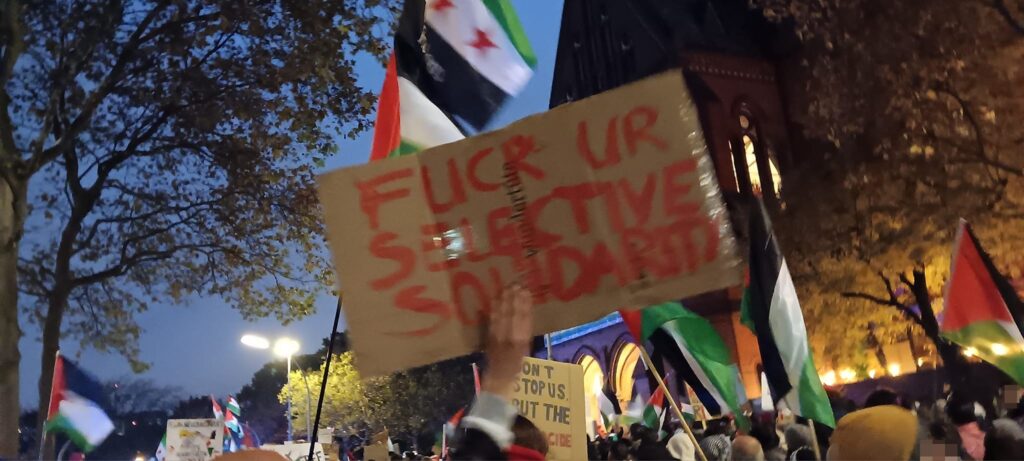
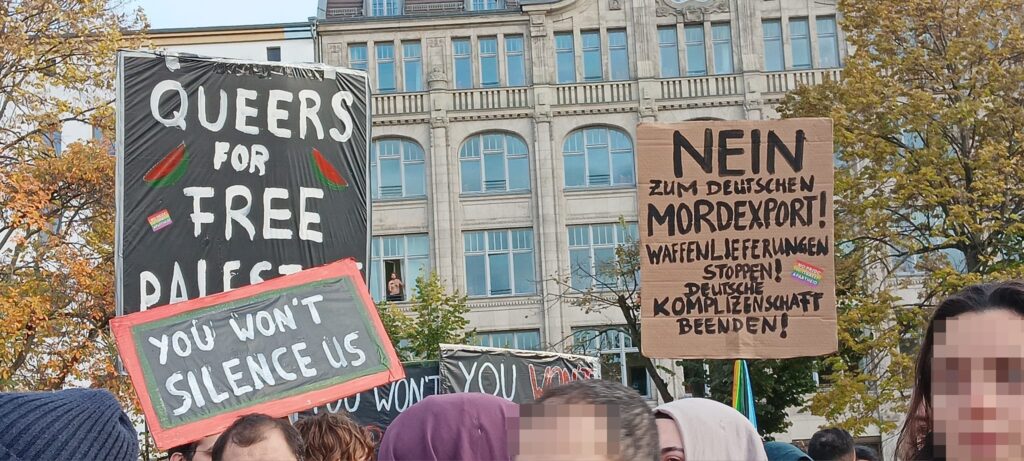
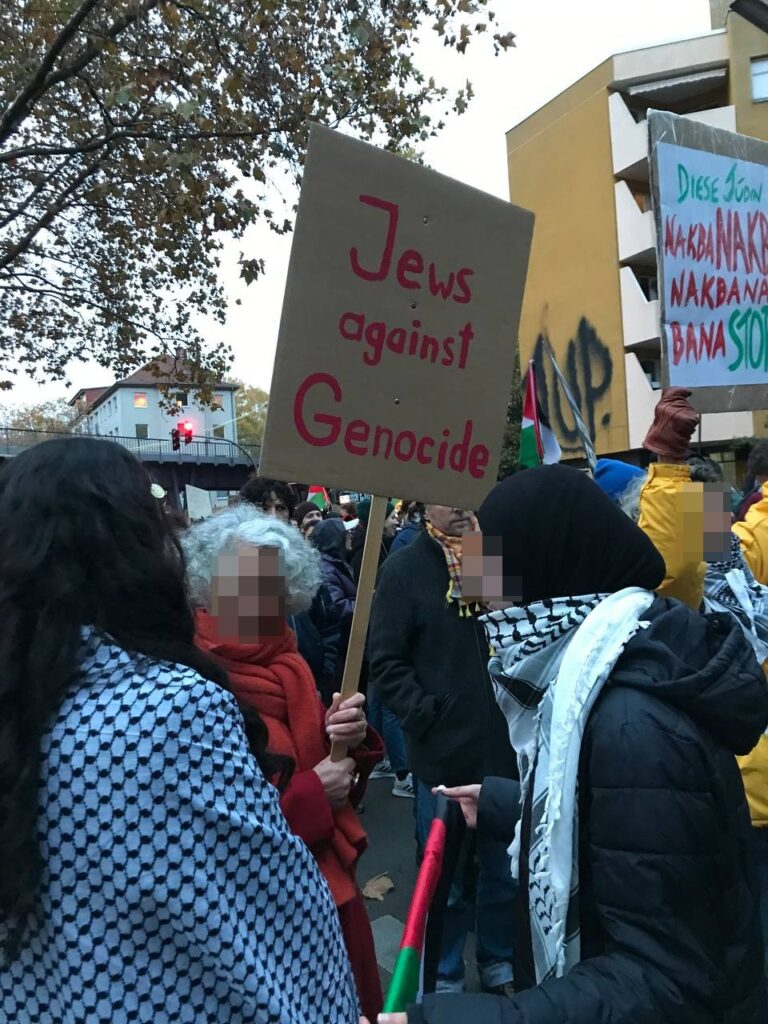
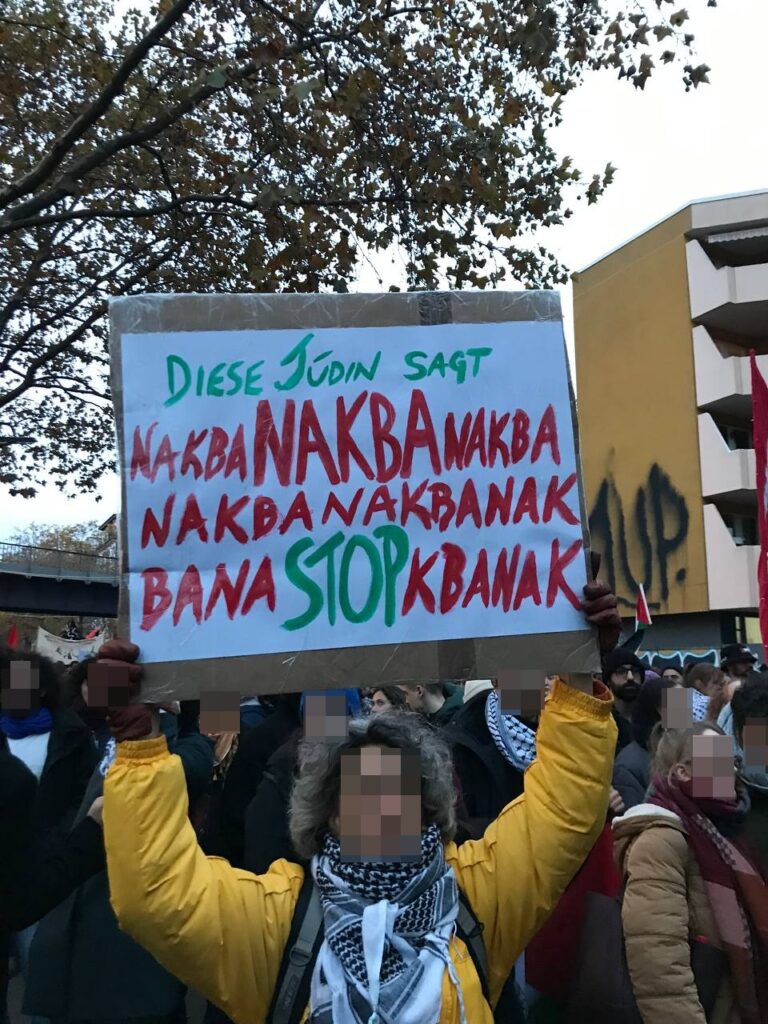
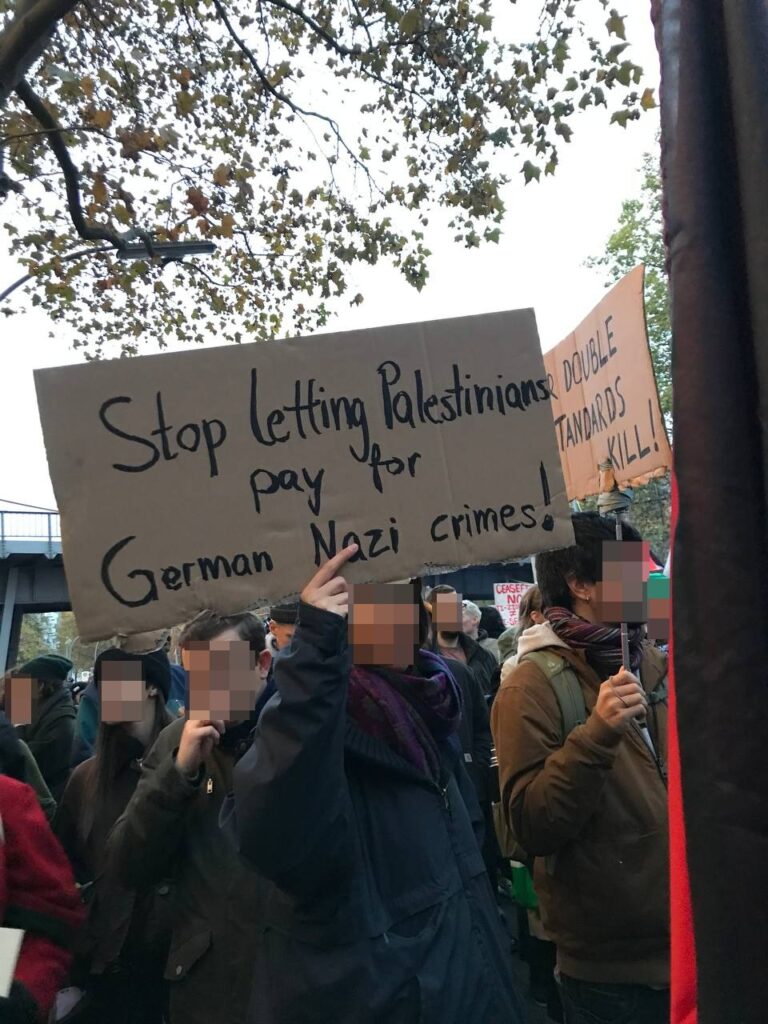
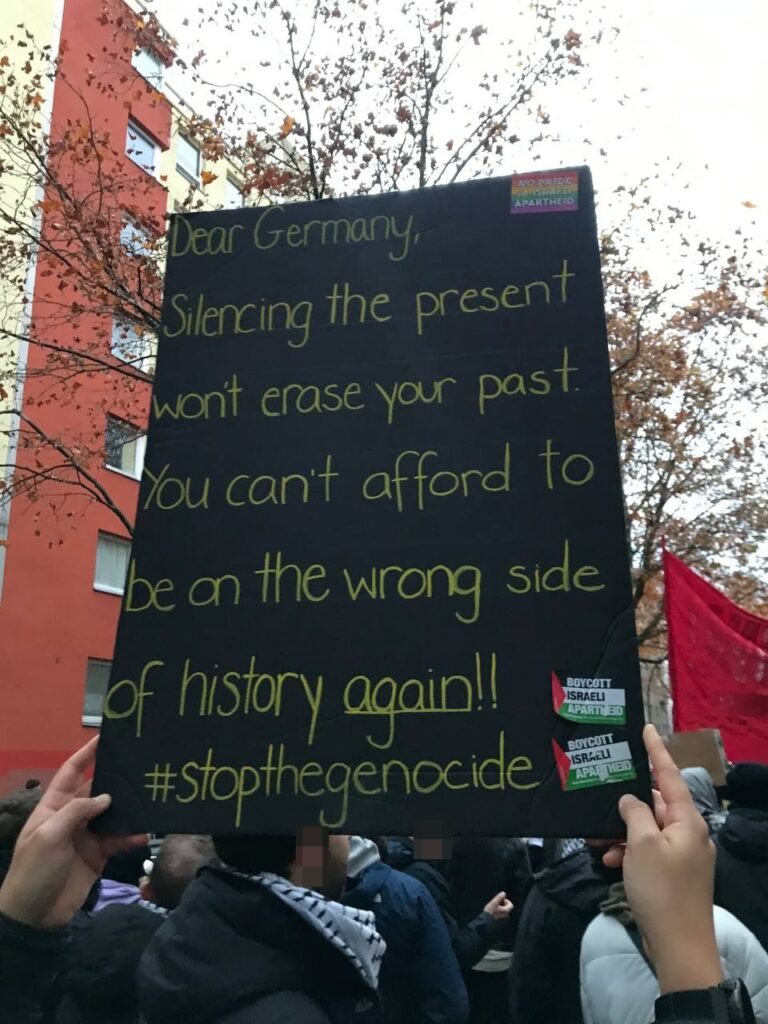
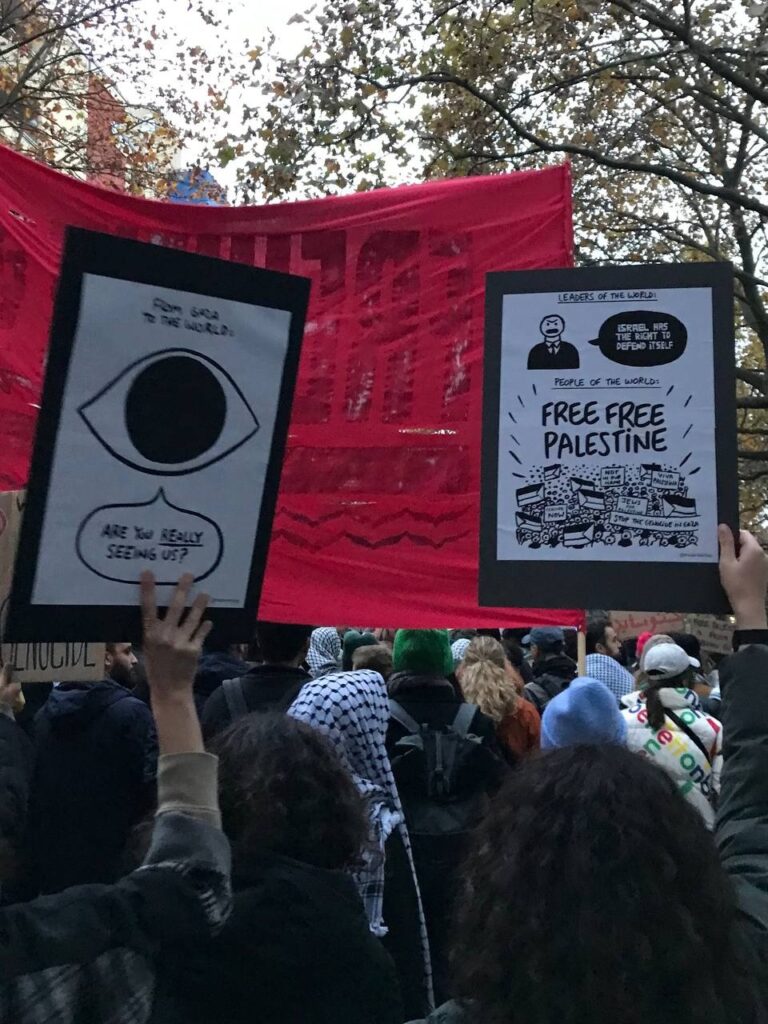
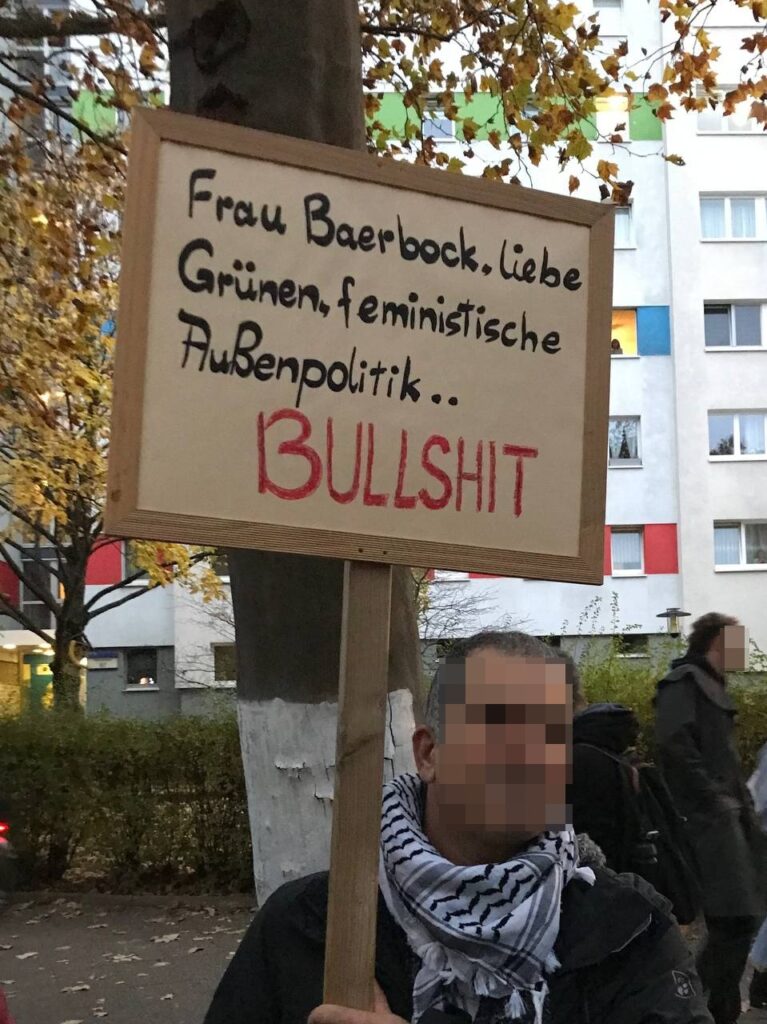
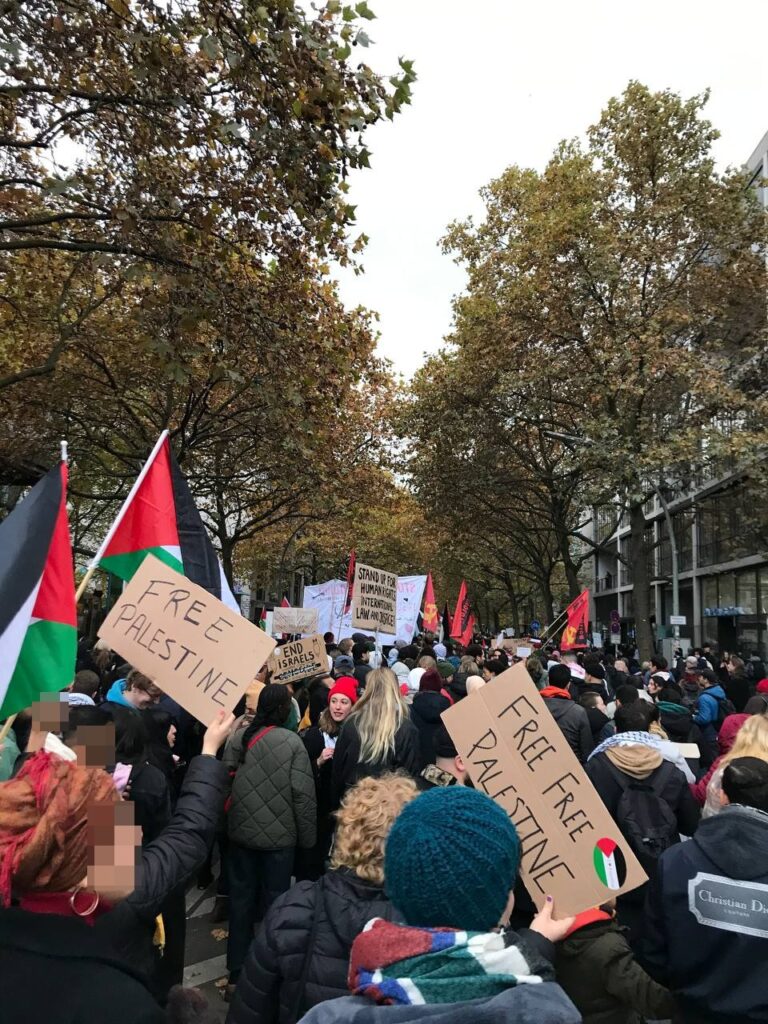
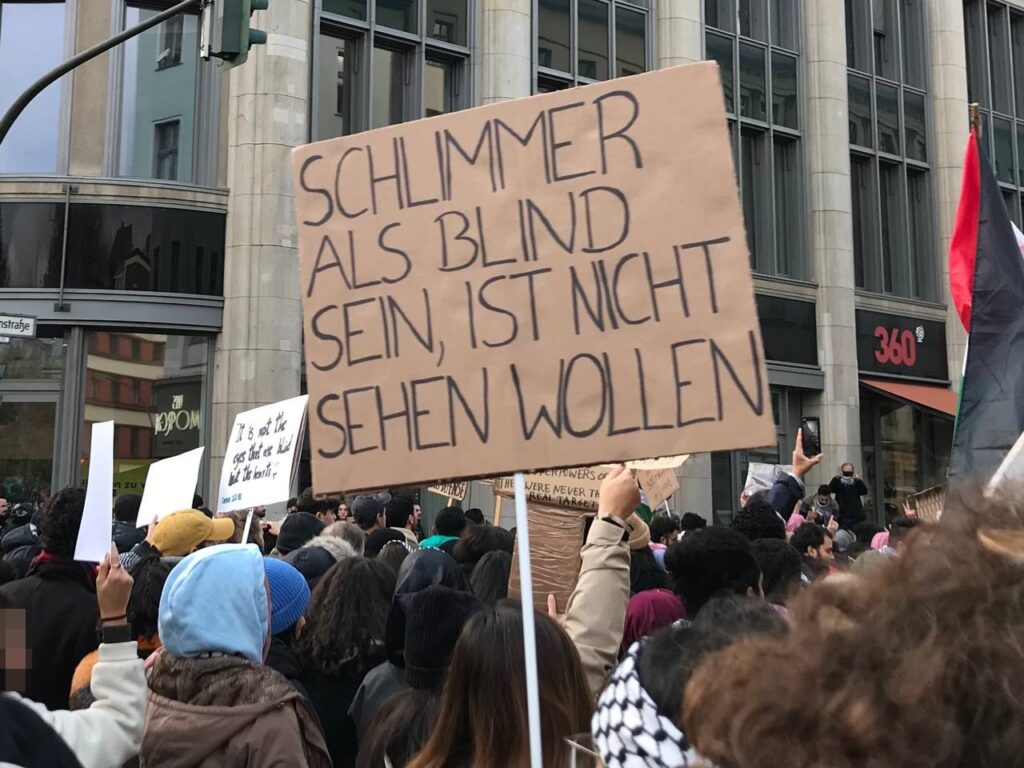
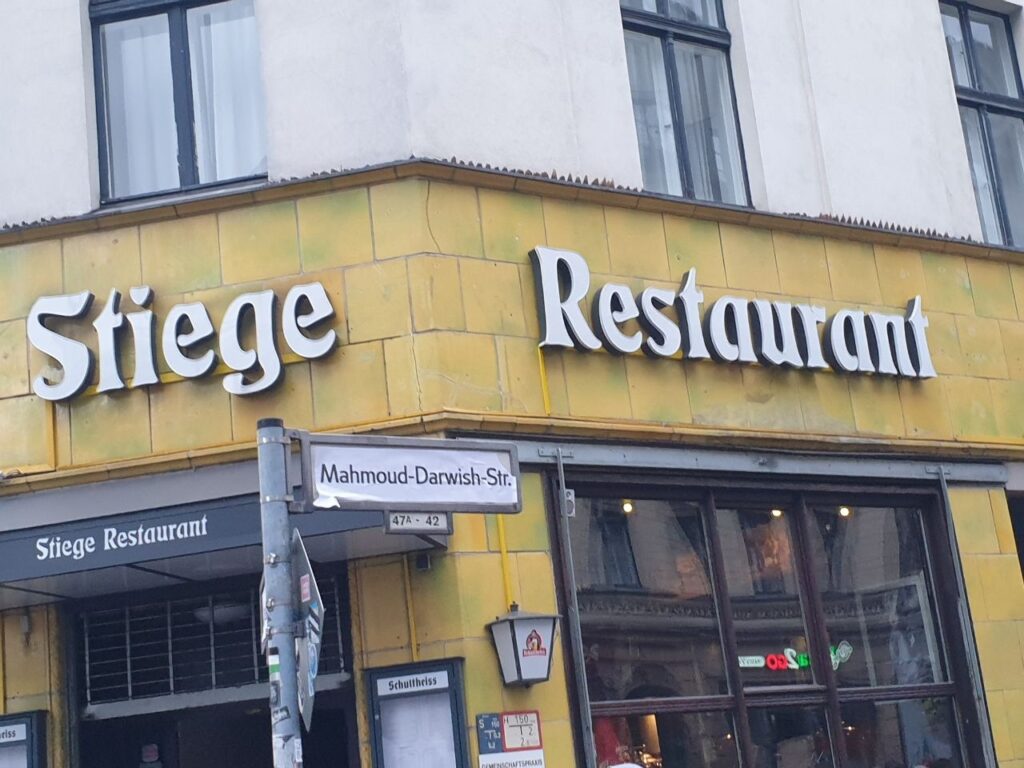
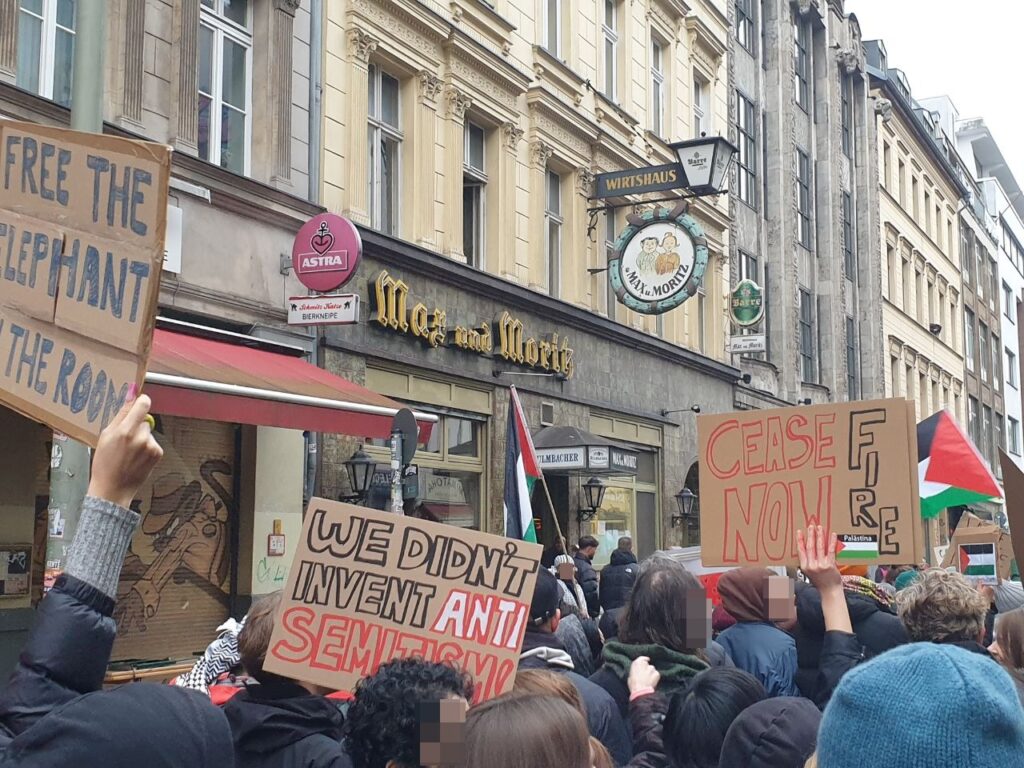
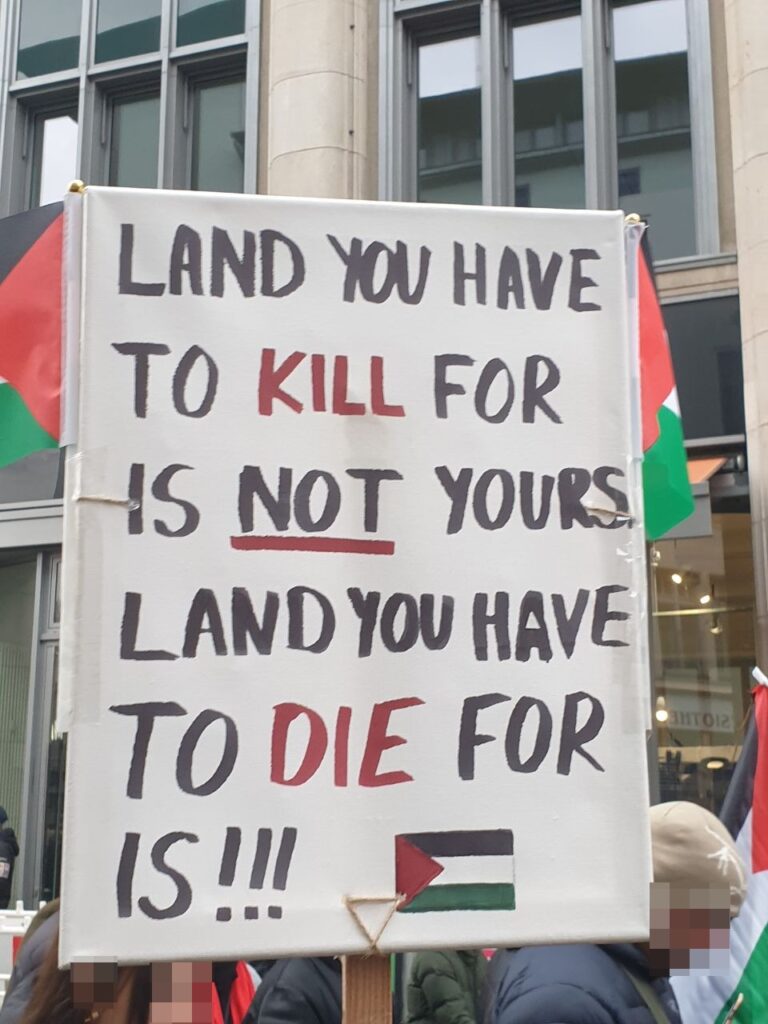
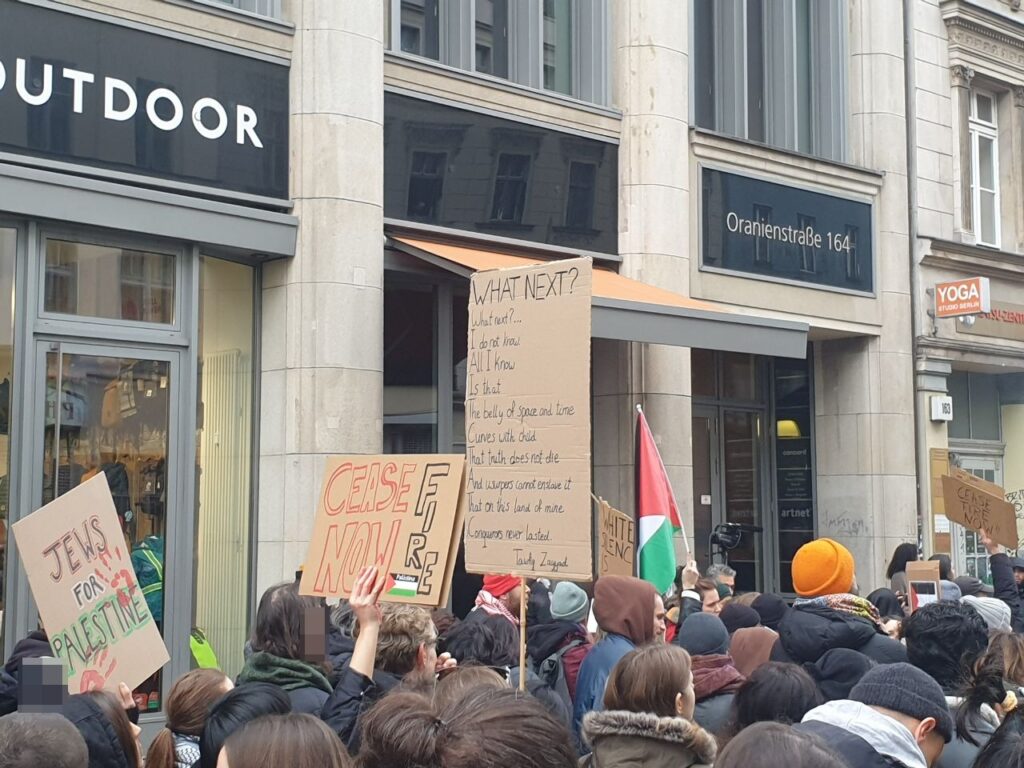
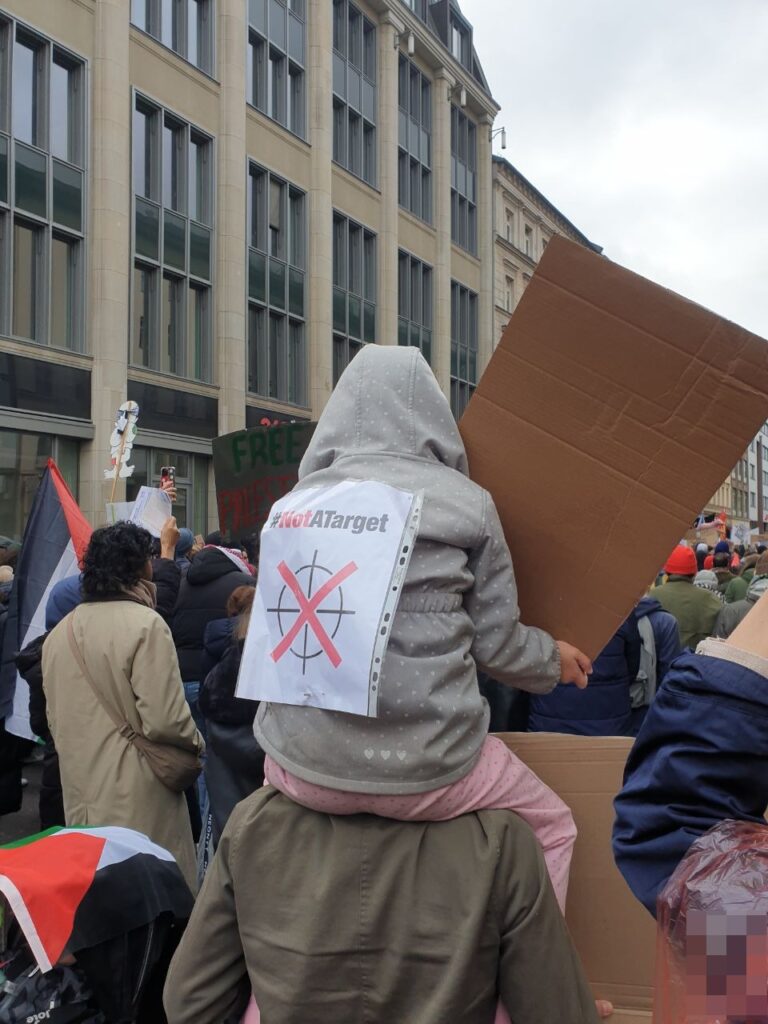
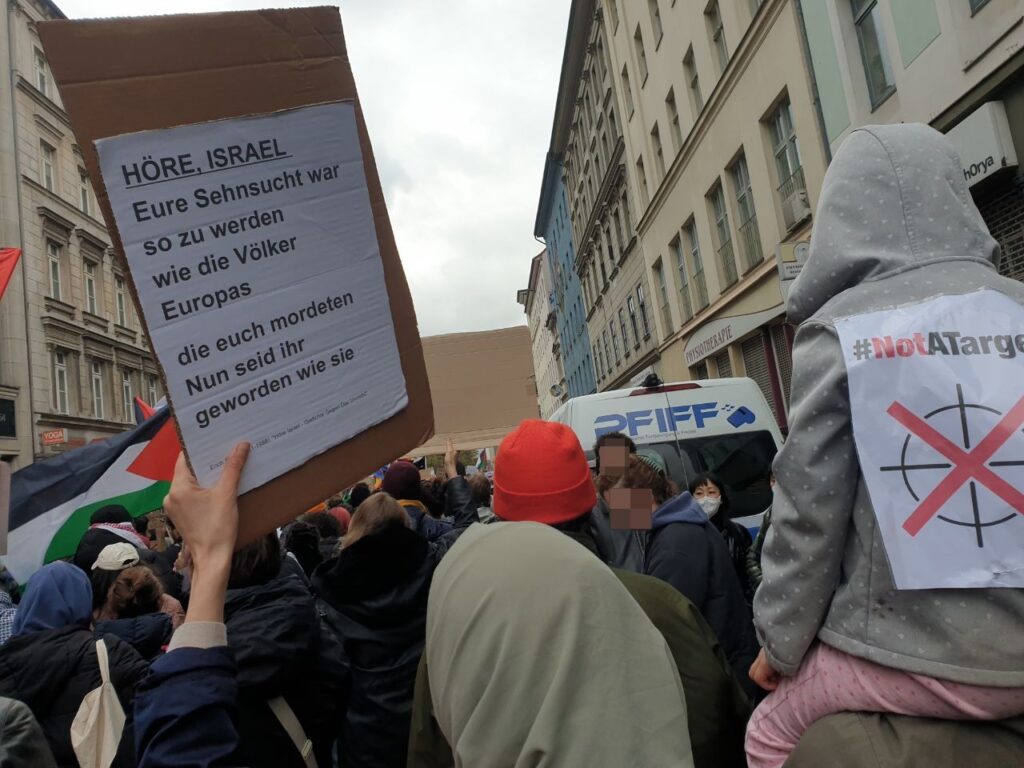
Oranienplatz to Mehringdamm
The Left Berlin
12/11/2023
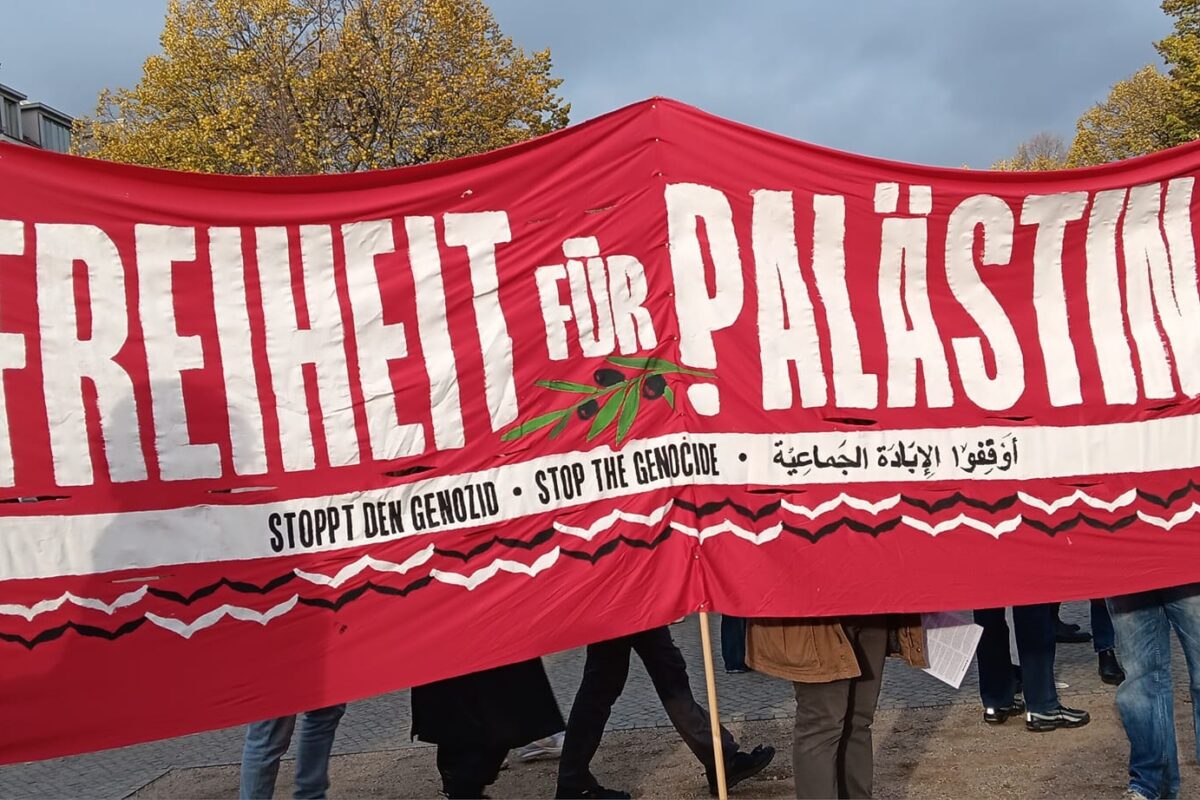
Photos: Phil Butland, Paul Grasse, Regina Sternal, Trad (@illustradtion)
Because of the current level of repression in Berlin against Palestinians and their supporters, most faces have been pixellated.






























































Part Two of our interview with Udi Raz on being sacked by the Jewish Museum and building Palestine solidarity in German Universities
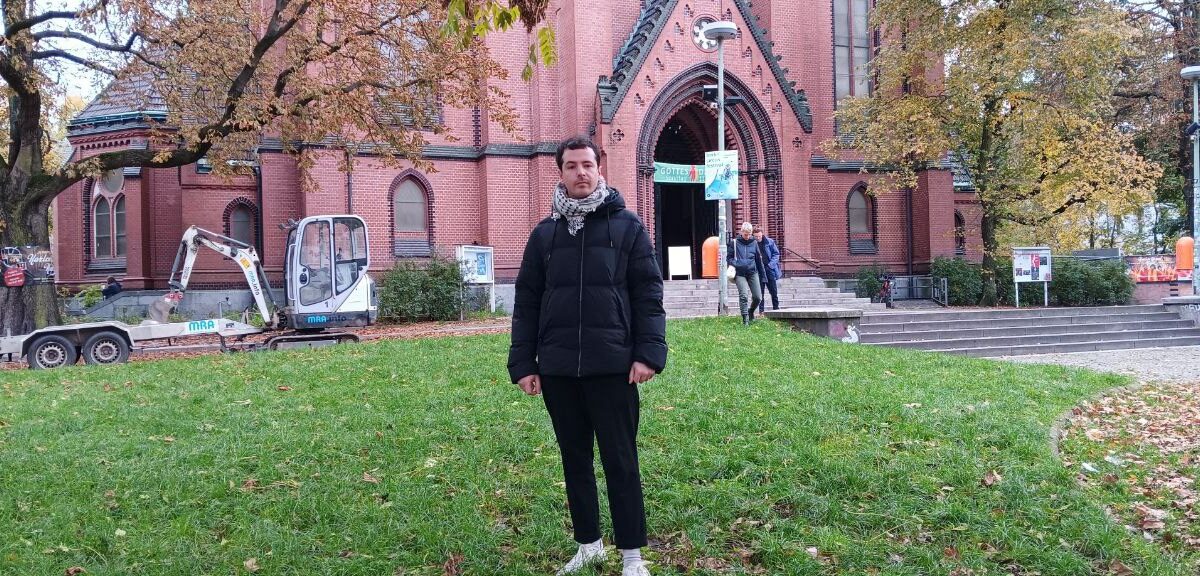
Following last week’s interview with Udi Raz on 20 years Jüdische Stimme, the interview continues to talk about his personal engagement, including his recent sacking by the Jewish Museum
Hello again, Udi. You have just been sacked by the Jewish Museum. Why?
The official reason is that I used the term “apartheid”. The Jewish Museum say that this term is unacceptable. The head of the museum’s education department told me that that high school students who come to the museum cannot comprehend what apartheid means.
The thing is that I use so many terms that people don’t know. This is exactly the essence of working in an education institution such as a museum. Especially the Jewish Museum which offers information about which young people do not have the opportunity to inform themselves within this the school system in Germany.
You’d have thought that if people didn’t know what apartheid means, you should say more about it, not less
This is the thing. In fact, I always explain not only that, I expand. I always begin by asking the participants in my tour whether they can explain to the rest of us what apartheid means. I never had an experience when nobody knew what apartheid is. There is always somebody within the group who understands the concept, and can explain exactly where it comes from, the historical context, and even why it applies to the situation in the West Bank.
You could say that I’m actually going very easy with the definition when I apply it to the situation in Palestine. According to Amnesty International apartheid applies to the entire area that we call Palestine, or Israel. But in my tours, I talk specifically about the West Bank.
People who didn’t grow up in Germany, have difficulty understanding the German education system, and particularly how it talks about in the Middle East. What’s your experience from the people on the tours that you give? What do they know? And what don’t they know?
What they want to know is exactly what I tell them. They want to hear a story that connects the story of Germany, Israel and what Judaism means. And I always tell them the story of why I came to Berlin. I was born and raised in a city called Haifa. At this point, I raise the question: “Where is Haifa?” What for example, would you say?
I’d say it’s on the Mediterranean coast
It’s on the Mediterranean. Some people refer to this area as Palestine while others refer to it as Israel. I grew up in a city where many Palestinians and Jews lived together. Since a young age, it was very clear to me that the place where I’m living has more than one name and that is absolutely fine.
But there is a certain region within this area that is called the West Bank with cities such as Ramallah and Jenin. There most of the population understand themselves as Palestinians and are so understood by the régime that controls them. A minority of the people in the area are Jews who live in so-called settlements. Israeli laws apply to people in the settlements, while Palestinian people living the same area are subject to the military law of the State of Israel.
Different laws apply to Jews than to non-Jewish people. And this is precisely one of the characteristics that According to Amnesty International, classify this situation, as apartheid.
Amnesty applies the term apartheid to the whole area, not just the West Bank. Haifa is probably the most integrated city in the whole of Israel or 1948 Palestine? Is it right to use the term apartheid about Haifa as well?
That’s a good question, and I don’t know. I did not inform myself well enough about the condition of Palestinian population living in 48, which is definitely a deficit. But exactly for this reason, I don’t talk about what I don’t know. I talk in my tours only about what I know. And I can give you plenty of examples why the situation in the West Bank must be understood as apartheid. It’s not a question of interpretation. It’s a matter of international law.
And your sacking was specifically because you called the West Bank an apartheid area?
Exactly.
Do you know who was ultimately responsible for your sacking?
The final decision was made by the head of the Education Department, Diana Dressel. She told me very clearly in the last conversation that we had, that I received plenty of praise. She even forwarded me some of this positive feedback before they fired me.
In the meeting, when they decided to fire me, she mentioned that she has a dilemma. Because I received a lot of praise. She finds that the pedagogic work that I’m doing is extraordinary. But since I used the term apartheid, she cannot allow me to receive new bookings.
I am a freelancer working for the museum, not a direct employee, so I can only work when they book me.
Do you think this is a decision taken by the museum without outside influence?
I know there are other reasons why I was fired. I will not reveal them now. But I am working with a lawyer and we are considering what what to do with the internal information that I have.
How would you categorize the Jewish museum? It puts on good exhibitions, and in the book shop you can buy CDs by the anti-Zionist singer Daniel Kahn. And yet this is not the first incident like this. The director Peter Schäfer was forced to resign after the museum retweeted an open letter by Jewish scholars against the criminalisation of BDS, and Yossi Bartal, your colleague in the Jüdische Stimme also resigned
For a few years, the museum enjoyed a sense of ambivalence. But with each new scandal that unfolds, we understand better what sort of institution the Jewish Museum is, what ideology it serves, and which policy leads their decisions.
In this case, apartheid is acknowledged, by Amnesty International, Israeli human rights organisations, and even by Zionist generals, to describe the situation in the West Bank. Therefore we can say clearly that there is no doubt that the decision to fire somebody for using the term apartheid is really a manifestation of gaslighting.
It’s not the question of whether “Is this the reality or not?” It is whether you are allowed to perceive this reality as such – yourself or not.
And you see it as part of the rising repression in Germany in terms of demonstration bans and room bans?
Absolutely. This is the thing. The museum wishes to sell itself as a pluralistic place, especially in the sense of hosting a diversity of Jewish voices. But it fails to do this again and again and again. The tragic thing is that most of the people who make the decisions – of who works here? What exhibitions will be there? What installations will be there? – are not Jews themselves.
Non Jews are constructing for Jewish people what Judaism means, what Jews are allowed to say, what Jews are not allowed to say, what Jews are within, what Jews are without. The Jewish Museum is only one case. This is true also in cases of the so called ‘Commissioners for Jewish Life in Germany‘ and the ‘Fight against Antisemitism’. E.g. Felix Klein, Samuel Salzborn, Michael Blume, Uwe Becker, Ludwig Spaenle, and the list goes on.
How have people reacted to your sacking?
99% of the messages I receive are supportive. I think that the population living in Germany nowadays understand the hypocrisy of their leaders, who stand in solidarity with Israel. That is a racist state, that is now forcing millions of Palestinians to become refugees, once again, killing thousands of Palestinians, even killing Israelis, who are hostages by Hamas.
The Israeli government is willing to kill those hostages, rather than to find a humanitarian solution. This really breaks my heart. It is something I cannot accept. It’s not even open for discussion to me. This is a strategy that is purely racist. And it comes at the stage where this government is willing to sacrifice its own citizens, in order to maintain a sense of enmity. One that is arguably inherent to understanding how Jews and Muslims or Jews and Palestinians should live their life.
Is there any sort of campaign to get you reinstated. Do you want to be reinstated?
Yes. I understand the work in the Jewish Museum as essentially important. It is exactly this kind of work that in the long run really makes an impact. Because those people who listen to my stories, also become the generation who will be allowed to vote in Germany. And if they truly care about Jews who live in Germany, they should at least understand what is being done in the name of Judaism by the State of Israel, and how Germany currently not only neutralizes this racist ideology, but also supports it.
If someone reads this interview and wants to do something against your sacking what should they do?
There is a few different attempts I’m working on at the moment. One of them is a petition. Another one is a press release about how I understand the situation. And the third one is eventually to collect of donations to support me throughout this time, because I was very much dependent on this work. It was the main job I had in the last few months. This also emphasizes the financial violence Germany exercises against Jews living here. I will share more information on my social media. Please follow me there, this is already a meaningful support. Let us support each other.
How can people put pressure on the Jewish Museum? Financial support is essential. But that doesn’t put pressure by itself?
Write to the Jewish Museum. Insist to receive the answers that you deserve
Would a boycott would be a good idea?
The museum is free anyway. Everyone can can go there any time. I do think that the installations one can find there have value by themselves, and could even have more value with the correct mediation. I left a group of amazing guides behind me, who are still working there. And I don’t see a reason to assume that the guides, who are also my friends, will fail to do the important work that they already do. To these guides I send my best wishes because what they are doing is fundamentally important work.
It’s important to emphasize that the problem is with those who make the policy of what people are allowed to think, and to know. The problem is not with the individuals who carry out the education work despite such restrictions.
How’s the museum financed?
The museum is public foundation, financed by the German state. And the decision making is controlled by the German government and state officials.
Is there any way that people can put pressure on the board?
Insist on the service you deserve. Write to any individual at any institutional level who you recognize within the structure of the museum. Because this case raises many questions for those who understand themselves as taking part in a democratic system.
What is happening here is precisely the opposite of promoting democracy. It is silencing and censoring, actually preventing knowledge and the truth from being presented as such.
Can we go on to an initiative that you’ve been working on recently – discussing Palestine in Berlin Universities? You organized a meeting last week. How did that go?
Two weeks in a row we had meetings with dozens of students from different universities in Berlin and Potsdam. We are receiving so much feedback from students, but also from workers and professors, about people who are afraid to speak up, as soon as you move from the perception that Jewish lives matters to the idea that Palestinian lives matter too.
It comes to this. Once you insist that everybody who lives in the same region, should be perceived as an equal human being, then you are targeted by sanctions, boycott, divestment, you name it. People have already lost jobs, – not only me. This atmosphere of fear currently characterizes universities in Germany.
This has nothing to do with the notion of academic freedom. In fact, it’s dangerous, not only for people in university, but for the entire society. Because thinking critically is the essence of how a democratic state can thrive.
Who is involved at the moment?
The people who are involved in organizing are students from different levels - Bachelor students, Masters, PhDs. We also have the support of many professors, and people who work within the structure of the university, not just teachers, but also researchers and administrative staff. I cannot mention the names of these brave people, because we they deserve protection.
We have students from different universities. This includes, the FU, HU, TU, UDK, Hertie School, Alice Salomon Hochschule, Potsdam University, and Filmuni Babelsberg.
Presumably it’s not just about talking. What are you planning to do?
We have formulated a petition with very clear demands. We want to emphasize that the current situation in academia in Germany cannot proceed the way it does at the moment. It is rooted in a racist understanding of how we should perceive the world. We reject this. Instead, we want to reclaim the academic freedom which should belong to us according to basic German law.
What’s the mix of backgrounds of people involved?
It’s really mixed – Germans, Palestinians, Israelis, and students from other countries. It’s people who understand that Palestinian lives matter. This is something which is very human and basic to understand.
Last week, I met a group of about 20 Spanish socialists, a number of whom were in the German education system. They were completely frustrated. They said, we want to help the Palestinians, but don’t know what we can do here. How could people like this support your campaign?
First of all, write us, connect with us at studentscollectiveberlin@gmail.com or on Instagram. We are there not only to work outwards, but also to support each other. This is one of the very important goals of this network that we established. We understand the severe restriction of academic freedom at the moment, and the severe consequences of this. And we are there to support you. So join us you’re, not alone.
At the moment, we have a good overview about different manifestations of repression, against individuals who speak up for basic human rights. Contact us, and we will provide you with the information that you need. If you yourself experience repression, also contact us, because we are building an archive which is unfortunately growing bigger every day.
Could you give a couple of concrete examples of what and how academic freedom has been restricted?
One example is from the Berlin Graduate School Muslim Cultures and Societies to which I am now affiliated. Shortly after the events on the 7th October, we approached the head of our institution offering to organize a public panel discussion. We proposed, with other individuals, that I report from my own research work over the last four years.
Together with a group of students, we wanted to address the repression of Palestinian voices today in Germany. The Berliner police arrested people wearing the kuffiyah at that time. We especially wanted to address this at a graduate school which claims to address realities of Muslim cultures and societies. As a researcher myself, I saw myself responsible for bringing in voices from my fieldwork into this academic sphere. We suggested panellists from ‘Palestine Speaks‘ and the ‘Palästina Kampagne‘, two organisations which are doing amazing work at making living experiences of Palestinians visible.
We were shocked by the refusal from the head of our institution to allow such a panel discussion, arguing that this topic is too political at the moment. At the same time, the university to which this graduate school is affiliated published a statement, showing solidarity only with the Israeli victims of the attack on the 7th October. The thousands of Palestinians who were killed in the name of the Jewish State were completely ignored by the university. This is a reality that we cannot accept.
The most visible repression in the education system at the moment is in schools. You talked about the kuffeyah ban, which was actually a ban on all “Palestinian symbols”. This was mainly implemented in schools. There’s the case of a teacher hitting a child. You’re mainly based in the university. Are you able to link up with people in the school sector as well?
We wish to extend our network as widely as possible. The message must be to anyone who is now confronting this racist repression that you are not alone. Wherever you are – in university higher education or lower education – Organize. Ask around and see that you are not alone.
But be careful. Beware of possible risks. We understand how much power racist people have nowadays. In today’s Germany.
You’ve had 2 meetings so far. Are you planning further meetings?
We are going to meet regularly. The petition is only one thing that we’re planning at the moment. We also support different initiatives that are specific to different universities. We are a collective of collectives. We do what we can to support each other. There are also people who work independently. Whenever they need anything from us. We are there for them.
Are there any specific initiatives planned?
Yes. We are working demonstrations within the campus, organizing panel discussion, and broadening our network. You can see all the relevant updates on our Instagram page.
How can people can help you?
Spread the message, spread the word. Help us to get this petition to anyone who needs to know about it. If you sign anonymously, we understand that for some people this is all thats possible at the moment. But this is also a huge support. You can also mention, as you sign, why you chose to sign this anonymously. You see, unlike what Germany wishes you to think, your voice is valuable and it matters.
Germany’s new proposed citizenship laws are a step in the right direction, but fails to fully recognise the needs of non-Germans
Shav McKay
11/11/2023
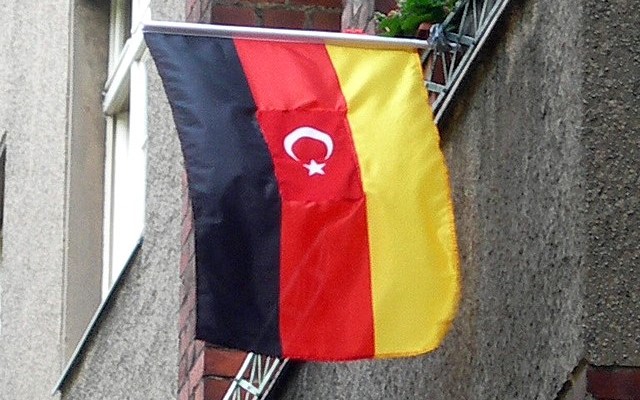
As part of the governing coalition’s plans to reform immigration, the Ministry for Internal Affairs (Bundesministerium des Innern und für Heimat, BMI) headed by Nancy Faeser (SPD) published a draft of amendments to citizenship law on 23 August 23 2023. The BMI calls its plan a ‘modernisation of citizenship law’ with the purported intention of making Germany more attractive and welcoming to immigrants.
Presently, German citizenship law grants citizenship through five channels: birth (to at least one German parent), declaration, assumption in childhood, members of German minority groups abroad who re-settle in Germany, and naturalisation (Einbürgerung). The amendments to the current law mostly pertain to naturalisation—the process of assuming a new nationality as a foreign citizen, of which there are 11.6 million in Germany.
Under current law, citizenship by naturalisation is available to foreigners who have neither been convicted of nor are presently involved in prosecution for high-level criminal offences; have secured a place to live; and have achieved ‘integration into the German way of life’. They must also either have cohabitated with a German spouse for at least three years, or have lived in Germany for a minimum of 8 years, in that time posing no threat to public safety and order; present evidence of secure means to support themselves and any dependents without social assistance; give up prior citizenships; and demonstrate ‘sufficient knowledge’ of German language and civics.
Suggested amendments in the recently published draft include:
Germany lags behind much of the world in its acceptance of multiple nationalities. According to Maastricht University’s Global Dual Citizenship Database, over 76% of nations have a positive policy toward plural citizenship. The database has documented a consistent increase in acceptance of multiple citizenship over the past several decades.
For many living in Germany, renouncing one’s original citizenship could pose an array of problems, such as endangering ease of contact with family and infringing upon a sense of personal identity.
While it is difficult to establish how many foreigners in Germany have abstained from naturalisation in favour of keeping their original citizenship, 5.3 million of them live in Germany long-term (i.e., at least ten years). One such individual is Berlin-based software tester Tekin. Despite a light but distinctly German Franconian accent, Tekin is a Turkish citizen.
‘I was born here, I went to school here, everything—despite that, I can’t vote. As soon as having a second passport is allowed, I’ll apply for it.’ Tekin has found the rise of the extreme right in Germany particularly distressing and is planning a two-month trip to Turkey to cope. ‘I feel so uneasy in Germany now. Every third person seems to be voting for the AfD and is therefore an incognito Nazi.’ An unwelcoming homeland and powerlessness to enact change democratically highlight the importance of both citizenships for Tekin.
Statista records Turkish nationals as the largest non-German minority in the nation at 1.5 million. If all 85 million people living in Germany had the right to vote, they would make up 1.8% of the voting population, with foreigners overall making up 14%.
Data on foreign nationals’ forecasted party alignment is scarce. However, a 2021 study in Duisburg found that German citizens with a Turkish background (either naturalised citizens or with at least one Turkish parent) were most likely to vote SPD (4% more so than those with no personal or familial immigration background). Participants also reported an incidence of voting for the Linke four times higher than that of those with no immigration background and a low incidence of voting for the AfD.
It remains to be seen how expedited naturalisation will be reflected in the German political landscape, but the represented parties shared their positions on the drafted amendments upon proposal this past May. From within the ruling coalition, the Green party hopes that the changes will make Germany a ‘more attractive’ immigration hub. The SPD placed emphasis on the need for double citizenship, while the FDP primarily cited the ostensible workforce crisis as a motivation for easing the path to citizenship.
The Linke notes that while immigration in Germany rises, naturalisation rates have stagnated. The party positions itself against exclusion from citizenship based on socioeconomic status, language skills, and civics tests, and stands behind implementing a right to dual citizenship.
To their point, applicants would not necessarily be denied citizenship for rightfully receiving social assistance. In addition, among the new amendments is the further reduction of the residency period from 5 to 3 years for ‘special integration efforts’ among which are listed excellent school achievement, C1 language knowledge, and volunteer efforts. Applicants are meant to meet conditions that are not imposed on ordinary Germans.
The BMI defines ‘integration’ as ‘a process with the goal of including all who live in Germany long term and legally in society…Immigrants have the obligation to learn the German language, to know, respect and follow the constitution and the law.’ It further states that integration gives immigrants the same chances and access to civil participation as native citizens.
The emphasis on ‘integration’ extends to the implementation of an Einbürgerungsfeier (citizenship ceremony). The Einbürgerungsfeier is one of several elements to the BMI’s new immigration package drawn from Canadian citizenship law. Canadian immigration policy awards points largely based on qualifications and existing job offers within Canada, but also deducts points for other factors such as age [1]. After five years, immigrants are permitted to apply for citizenship. The citizenship ceremony in Canada is a symbolic event at which successful applicants take an oath declaring their new citizenship.
Canada is far from a multicultural paradise, as was laid bare in past years when atrocities of residential schools were exposed to the world, and when right-wing demonstrations took hold during the pandemic. Yet, it does have some cultural advantages where Germany has deficits which may have been lost in translation during the BMI’s consultation on Canadian immigration policy, and which will be difficult to remedy with a state-mandated party.
95% of Canadians are non-indigenous and thus have a history of immigration. Canada is sometimes described as a cultural ‘mosaic’ to differentiate it from the US ‘melting pot’. If the US-American historical approach to immigration and naturalisation has been ‘anyone can become American’, Canada’s is ‘many different people are Canadian’. The elementary school curriculum in Ontario, Canada’s most populated province, prescribes the acknowledgement of Canada as a nation of immigrants and encourages students’ discussion of their own heritage and immigration history, where applicable. Global citizenry is introduced as a concept as early as age six, with asylum-seeking and immigration the following year. Cultural coexistence is not only an academic affair; an estimated 4.6 million Canadians speak a non-official language at home and around half of residents in Toronto, the nation’s largest city, are immigrants. Equivalent information is difficult to find in Germany, partly because of restrictive policies on data collection regarding race and cultural background.
Moreover, the recent quashing of demonstrations in support of Palestine call into question Germany’s preparedness as a society to welcome diversity. It raises concerns surrounding what actions could be seen as ‘failed integration’. Middle East Eye reported an estimate of up to 100,000 Palestinians and descendants in Germany with 25,000 in Berlin alone, making it home to one of the largest Palestinian diaspora outside the Middle East. Despite Palestinian families making up a significant minority in Germany, recent events have illuminated legislative and social rigidity regarding cultural acceptance. The keffiyeh, a scarf culturally significant to Palestinians, is banned in Berlin schools. In another incident, a dispute over a student bringing a Palestinian flag to school resulted in a teacher punching a 15-year-old student in the face.
A shortened wait before becoming a citizen and a positive policy move toward dual citizenship are encouraging and necessary changes. Nonetheless, as Berlin internationals watch increasingly unbridled oppression of free speech unfold in the streets, they may be forced to wonder if their resistance could prove burdensome on their pathway to citizenship. All the while, Faeser crams a mosaic of traffic onto a one-lane assimilation street—without the infrastructure to support Germany in integrating into a multicultural society, the nation is unlikely to become more welcoming and ‘attractive’ to non-German citizens through policy alone.
The draft is now in the Bundestag, where changes can be suggested. Official dates for the law to come into effect have yet to be announced, but the BMI projects it will be finished ‘in the first six months of 2024’.
Tekin eagerly awaits becoming a citizen of the country they call home, voicing frustration with their exclusion from politics. ‘It doesn’t matter what I achieve here, as long as I’m not German on paper, I can’t partake in decision-making. My future is in the hands of others. And it’s not looking good.’ Even in the best of cases, they have reservations about the social impact—or lack thereof—that a German passport will bring.
‘Germany doesn’t give me a feeling of belonging…even when I’m ‘‘officially’’ German, I’ll still be a foreigner to others, despite being born and raised here. And in Turkey, I’m an Almanci. I’m not a German in Germany, I’m not a Turk in Turkey—I’m Tekin.’
Footnotes
An open letter from Oyoun cultural center, in response to response to the Berlin Minister of Culture’s attempt to discontinue its funding because it hosted a Jewish organisation.
The Left Berlin
10/11/2023
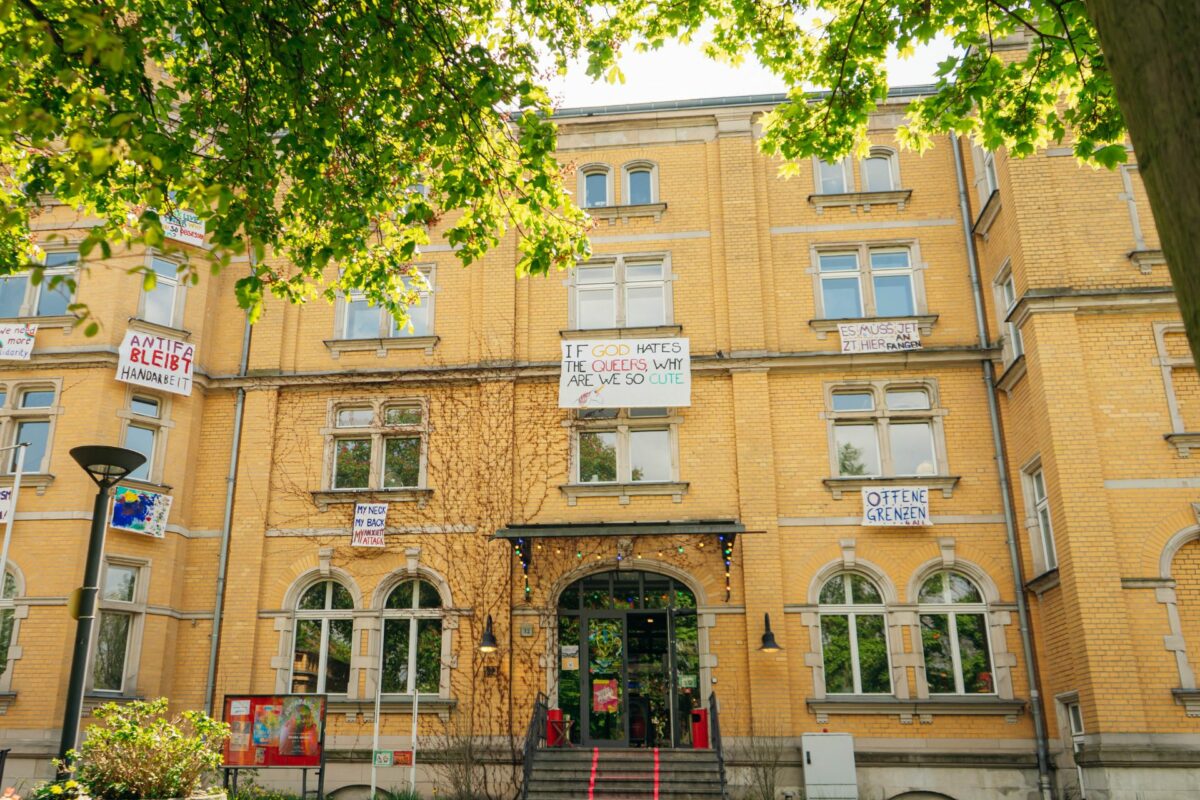
Deutsche Version folgt
Since the Cultural Committee (Kulturausschuss) meeting on 6 November 2023, it is official: Berlin’s Senator for Culture Joe Chialo (CDU) is examining measures under subsidy law to discontinue funding for Oyoun. The far-right AfD has expressed its gratitude.
We call on the Berlin Senate to continue funding the state-owned cultural centre at Lucy-Lameck-Straße 32 in Berlin-Neukölln.
Since 2020, this venue has been called “Oyoun” and today employs 32, mostly marginalised, staff and fellows. Oyoun is an important venue in the intersectional art and culture scene, which primarily focuses on queer*feminist, migrant and decolonial perspectives and has already received several international awards for its work. In 2023, there were 5,872 requests to use the space, and 580 events took place over 327 days with approx. 82,100 visitors..
It is impossible to imagine cosmopolitan Berlin without Oyoun—but its existence is acutely under threat.
The impending closure of Oyoun was provoked by an event that took place on 4 November 2023 on the premises of Oyoun: an evening of “mourning and hope” by the organisation Jewish Voice for a Just Peace in the Middle East, the German section of the international umbrella group European Jews for a Just Peace. The association is dedicated to “informing about the necessity and possibility of a just peace between Palestine and Israel” and “actively working towards the realisation of a lasting peace that is viable for both nations”. In 2019, the organisation was awarded the Göttingen Peace Prize.
Oyoun had rejected the Berlin Senate’s request to cancel the event and explained its decision in a statement.
The cancellation of Oyoun’s funding would mark the end of freedom of speech and artistic freedom in Germany.
On 22 October 2023, 100 Jewish artists, writers and academics based in Germany signed an open letter “As our Arab and Muslim neighbours are beaten and silenced, we fear the atmosphere in Germany has become more dangerous—for Jews and Muslims alike—than at any time in the nation’s recent history. We condemn these acts committed in our names. We further call on Germany to adhere to its own commitments to free expression and the right to assembly as enshrined in its Basic Law.”
All these people should have the opportunity, within the framework of freedom of expression, to speak together and publicly, to mourn and enter into dialogue with one another. It seems ironic when Jewish people and groups are labelled or even defamed as anti-Semitic by German politicians and media.
However, on 31 October 2023, the Green parliamentary group published a press release entitled “Funding for Oyoun must be ended (Förderung von Oyoun muss beendet werden)“, in which MP Susanna Kahlefeld accuses the cultural centre Oyoun of acting in an antisemitic manner. Oyoun considers these accusations groundless and explicitly rejects them. Already on 1 November 2023, the Senator for Culture announced in the Berliner Zeitung that he would “fundamentally review the financial support of Oyoun […] to quickly come to a conclusion and take action”, after the Berlin Senate refused to talk to Oyoun six times.
The cancellation of funding means the end of an organisation that actively practises anti-discrimination and social criticism and contributes to Berlin’s religious, cultural, ethnic and political plurality.
Freedom of expression and artistic freedom also uphold the internationalism and cosmopolitanism of cultural life in Germany. It is the task and duty of publicly funded cultural venues to reflect diversity of opinions. Democracy needs places where marginalised, intersectional, pluralistic perspectives are presented and discussed in society, art and culture.
A policy of repressing critical voices causes serious damage to freedom of expression and thus to democracy in Germany. Berlin needs cultural spaces that are dedicated to the issues and concerns of its immediate neighbourhood.
We call on the Senate to grant further funding to Oyoun and protect migrant, queer*feminist and Jewish life in Germany.
Oyoun must stay. Especially in Germany. Especially now.
Further links (German)
Wir fordern den Berliner Senat auf, die finanzielle Förderung des landeseigenen Kulturstandortes in der Lucy-Lameck-Straße 32 in Berlin-Neukölln fortzusetzen.
Seit 2020 trägt das Haus den Namen „Oyoun” und beschäftigt heute 32, mehrheitlich marginalisierte, Arbeitnehmer*innen und Fellows. Das Oyoun ist ein bedeutender Ort der intersektionalen Kunst- und Kulturszene, der v.a. queer*feministische, migrantische und dekoloniale Perspektiven zentriert und für seine Arbeit bereits mehrfach international ausgezeichnet wurde. Im Jahr 2023 gab es 5872 Raumanfragen und 580 Veranstaltungen an 327 Veranstaltungstagen mit ca. 82.100 Besuchen.
Das Oyoun ist gerade aus dem kosmopolitischen Berlin nicht wegzudenken – doch seine Existenz ist akut gefährdet.
Der Grund für das drohende Aus von Oyoun ist eine Veranstaltung, die am 04.11.2023 in den Räumen des Oyoun stattfand: eine „Trauer- und Hoffnungsfeier“ der Organisation „Jüdische Stimme für einen gerechten Frieden in Nahost“, die deutsche Partnerorganisation der internationalen Menschenrechtsorganisation „European Jews for a Just Peace”. Der Verein sieht seine Aufgabe darin, „über die Notwendigkeit und Möglichkeit eines gerechten Friedens zwischen Palästina und Israel zu informieren” und sich „aktiv zur Verwirklichung eines dauerhaften und für beide Nationen lebensfähigen Friedens” einzusetzen. 2019 wurde der Verein mit dem Göttinger Friedenspreis ausgezeichnet.
Oyoun hatte die Aufforderung des Berliner Senats, die Veranstaltung abzusagen, zurückgewiesen und die Entscheidung in einem Statement erläutert.
Die Absage der Förderung würde das Ende der Meinungsfreiheit und der Kunstfreiheit in Deutschland markieren.
Am 22.10.2023 unterzeichneten 100 in Deutschland beheimatete jüdische Künstler*innen, Schriftsteller*innen und Wissenschaftler*innen einen offenen Brief „Wir befürchten, dass mit der derzeitigen Unterdrückung der freien Meinungsäußerung die Atmosphäre in Deutschland gefährlicher geworden ist – für Juden und Muslime gleichermaßen – als jemals zuvor in der jüngeren Geschichte des Landes. Wir verurteilen diese in unserem Namen begangenen Taten. Wir fordern Deutschland auf, sich an seine eigenen Verpflichtungen zur freien Meinungsäußerung und zum Versammlungsrecht zu halten, wie sie im Grundgesetz verankert sind.”
Alle diese Menschen sollten im Rahmen der Meinungsfreiheit die Möglichkeit haben, gemeinsam und öffentlich zu sprechen, zu trauern und miteinander in Austausch zu treten. Es wirkt zynisch, wenn jüdische Personen und Gruppen von Deutschen Politiker*innen und Medien in die Nähe des Antisemitismus gerückt werden oder sogar als antisemitisch diffamiert werden.
Am 31.10.2023 jedoch publizierte die Grüne Fraktion eine Pressemitteilung unter dem Titel „Förderung von Oyoun muss beendet werden”, in der die Abgeordnete Susanna Kahlefeld dem Kulturzentrum Oyoun vorwirft, antisemitisch gehandelt zu haben. Diese Vorwürfe erachtet das Oyoun als unbegründet und haltlos und weist diese ausdrücklich zurück. Bereits am 01.11.2023 kündigte der Kultursenator in der Berliner Zeitung an, die finanzielle Förderung von Oyoun „grundsätzlich zu überprüfen (…) schnell zu einem Ergebnis zu kommen und zu handeln” – und das nachdem der Berliner Senat das Gespräch mit Oyoun sechs Mal ablehnte.
Die Absage der Förderung bedeutet die Schließung einer Organisation, die aktive Antidiskriminierungsarbeit und Gesellschaftskritik praktiziert sowie zur religiösen, kulturellen, ethnischen und politischen Pluralität Berlins beiträgt.
Mit der Meinungs- und der Kunstfreiheit wird zugleich die Internationalität, die Weltoffenheit des kulturellen Lebens in Deutschland, verteidigt. Es ist die Aufgabe und Pflicht öffentlich geförderter Kulturorte, Meinungsvielfalt abzubilden. Die Demokratie braucht Orte, in denen marginalisierte, intersektionale, pluralistische Perspektiven in Gesellschaft, Kunst und Kultur präsentiert und diskutiert werden.
Eine Politik der Repression kritischer Stimmen fügt der Meinungsfreiheit und damit der Demokratie in Deutschland schweren Schaden zu. Berlin braucht Kulturangebote, die sich den Themen und Sorgen ihrer unmittelbaren Nachbarschaft widmen.
Wir fordern den Senat dazu auf, Oyoun weiterhin Mittel zur Verfügung zu stellen und dadurch migrantisches, queer*feministisches und jüdisches Leben in Deutschland zu schützen.
Oyoun muss bleiben. Gerade in Deutschland. Gerade jetzt.
Weitere Links:
Palestinian liberation is the most intersectional of all struggles in the world today
Tareekh Yaadgar
08/11/2023
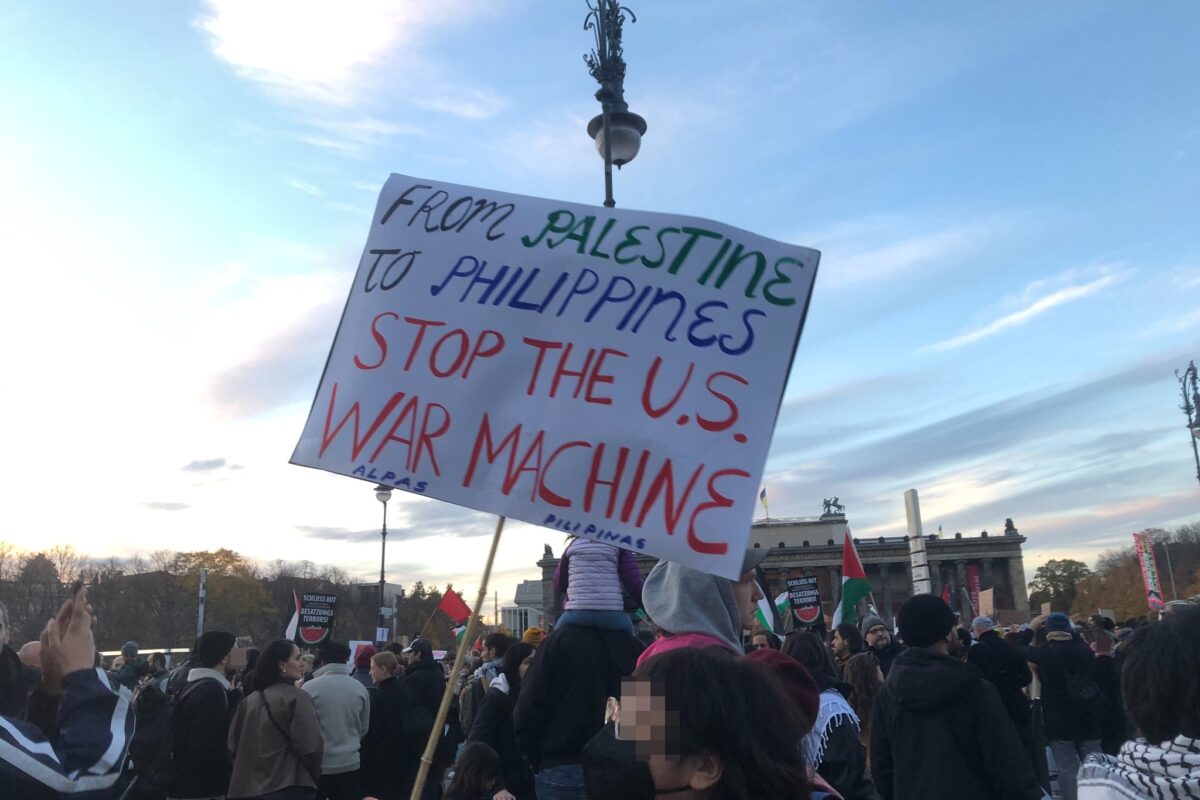
In the night of our ignorance, all foreign forms seem to take the same shape. For people in the Global North, accustomed to floods of information, Palestine is situated in the imagination as just one of many innumerable injustices in the world; a rather terrible but nevertheless unexceptional case of injustice. When we try to exceptionalise causes closest to our hearts, we risk fragmentation into an amorphous collection of interest groups that are motivated more by a desire for self-aggrandisement than by a desire to end injustice. Therefore, it begs the question, whether the current situation in Palestine is truly exceptional or just another terrible example of injustice.
Seen from any single vantage point, Palestine is a familiar story. Palestinians are not the first people to suffer death and dispossession. Within the same decade as the Nakba, meaning catastrophe in Arabic, approximately six million Jews were industrially slaughtered by Germans in the Shoah, meaning catastrophe in Hebrew. The mere juxtaposition of these two catastrophes is to invite fury, particularly among a German audience that believes that the Shoah was a singular, incomparable tragedy. And furthermore, based on current events and narratives, no entity understands the Shoah better than the Germans; not even the descendants of Jews murdered in the Shoah. It is a peculiar possessiveness on their part and I am left to wonder, if the Shoah is some trophy to be jealously guarded?
The Holocaust cannot be relegated to being an exclusive lesson for Germans nor an exclusive memory for Jews. It must be remembered that alongside Jewish people, Roma and Sinti peoples, disabled people, and homosexuals were targeted for summary execution. To excluvise the Holocaust then is to deny its voraciousness for human life. For its reverberations are felt to this day, its memory a permanent warning to all generations. If it is a singular event in human history, it is because its lessons are so universal whether one directly participated in it or fell victim to it.
Seen in this context, the German state’s zealous policing of thought around the subject betrays a desire to assimilate the Holocaust into a perverse nationalist identity. The ultimate expression of this perverse nationalism is a tribalistic allegiance to the state of Israel. Germany, in its eagerness to avoid being on the wrong side of history ever again, engineers a self-fulfilling prophecy whereby it condemns itself to being an accomplice in the ethnic cleansing and potential genocide of Gazans.
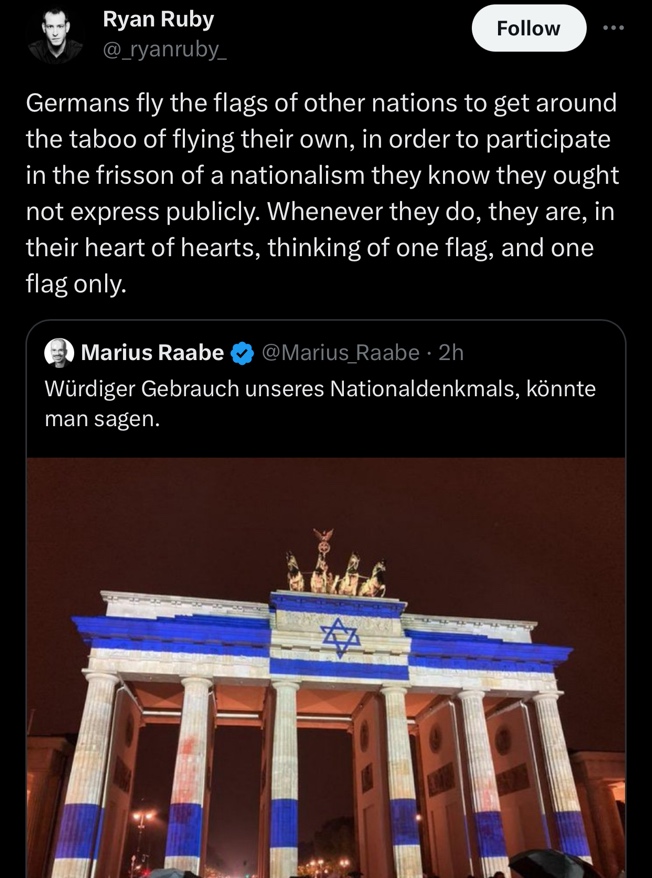
I for one hate comparing the severity of tragedies. Can’t a tragedy just be a tragedy without being weighed on some arbitrary scale of comparative suffering? Don’t Palestinians have a right to name their catastrophe without being accused of trying to steal attention from the catastrophe of Jewish people by some clone of Friedrich Merz? Must we wait until a genocide reaches its bloody conclusion before we make a comparison to another? When all there is left to do is to document the destruction. Wouldn’t it be better if we acted with abundant caution and at the first sign of overlap between the past and present, acted swiftly to prevent a recurrence? Or would we rather deny anything like a genocide or ethnic cleansing is happening until it becomes indisputable and irreversible?
The response of the Global North towards the actions of the Israeli state, the stubborn belief that Israel is a homeland for Jews, that only Israel can speak for Jewish interests or protect Jewish lives, all stem from a desire for convenience. Unflinching support for Israel has been particularly convenient for sanitising the unapologetic antisemitism of the single greatest threat to Jewish life in Europe: the far-right. By sacrificing Palestinian lives, Christian Europe helps bury its collective guilt for the prosecution of the Holocaust while simultaneously resuscitating the political forces that delivered it; no nation serves as a better example of this dynamic than Germany, where the neo-fascist AfD has surged to second place in the backdrop of Islamophobic discourses around “imported” antisemitism.
“…the prospect of a partnership with the people who had presided over Auschwitz scandalised Israeli Jews, especially the survivors, many of whom already found Ben-Gurion’s state to be a chilly place. When his negotiations with Konrad Adenauer were made public, Ben-Gurion had to call in the army to suppress a demonstration in Jerusalem at which Begin described reconciliation with Germany as ‘the most shameful event in our people’s history’. But, as Ben-Gurion saw it, ‘money has no odour.’ The Germans, keen to be rehabilitated in the eyes of the West, were easy to persuade. By the end of the decade the Germans were supplying Israel with arms and buying Uzis.” (We are conquerors – Adam Shatz)
Palestine is exceptional not because it is different, but because it is so strikingly familiar. It is as if all the horrors that can be visited upon a people are being visited simultaneously on them, in an age that has the living memory of witnessing all of this once before but refuses to acknowledge it is happening again.
Steinbeck wrote: “An unbelieved truth can hurt a man much more than a lie. It takes great courage to back truth unacceptable to our times. There’s a punishment for it, and it’s usually crucifixion.” I write these words in the context of a systematic denial of Palestinian suffering that has become institutionalised in the Global North. A few examples here, here, and here.
Just as Palestinians claim a right to return to the lands and homes they were displaced from, so do the Chagos Islanders, a five decade old struggle. Neither are the Palestinians the only victims of occupation and overt colonisation in the world today. The people of Western Sahara have been abandoned by the international community to the whims of an absolute monarchy, namely Morocco. Coincidentally, the flag of Western Sahara, subtracting a star and crescent, becomes the flag of Palestine. Palestinians are not the only people being bombarded by a vastly more powerful military. The people of Iraq, Syria, Lebanon, Libya, and Ukraine can attest to the horror of indiscriminate attacks on civilians by a foreign power. Nor are the Palestinians of Gaza the first to suffer a prolonged siege, for the people of Srebrenica and Sarajevo experienced it all in the 90s. Palestinians in the West Bank live under a system of apartheid, a relic of segregation in South Africa, as attested by several international organisations like Human Rights Watch and Amnesty International.
But I think I may have stumbled upon one truly unique aspect of the Palestinian experience. The attacks on Gaza are the first case of witnessing genocide via Instagram. I recall the image of a distraught father waving the remains of his child in a plastic bag and it struck me that Gazans are currently being forced to desecrate their children’s remains in order to garner enough sympathy for the genocide to merely pause. I couldn’t think of a single case where people felt the need to use the mutilated remains of their loved ones in real time. Billions of people have access to these images today in a way they did not have for Srebrenica.
And the intent is always the same, which is to say “take pity on us at last and convince someone to stop our brutalisation”. In response, many of us struggle, quite literally, to lift a finger to hit the like button. How can one “like” something so grotesque as a mutilated corpse? Yet for the sake of the Palestinians, this is what we are being asked to do, if only to help amplify the sound of their suffering so it may reach the right, usually white, ears being drowned out by propaganda meant to dehumanise an entire people. Unlike previous attempts at genocide, where we could claim a degree of ignorance, where the fog of war and the paucity of verifiable information caused hesitation to act, we are today faced with the prospect of having abundantly graphic evidence and simply tune it out of our minds. Like some pauper on the street begging for change, our humanity seems so withered that we now witness an entire people’s annihilation with apathy.
I am reminded of my brother’s funeral, where my father was able to bury his son at a time, a place, and in a manner that gave him some sense of closure. I then force myself to imagine, if all that remained intact of my brother’s flesh was an arm and a mutilated face, and then, my father had to display these remains in front of a camera, in the hope that perhaps what’s left of his family and his community could be spared enduring a similar fate.
I refuse to say how Palestine is different from, say, the Kurds being bombed under Erdogan’s orders in Rojava, or the Ukrainians being killed by Russia in its doomed attempt at colonial conquest, or the Bosnians killed by Serbs, or the Jews killed by Christian Europe over centuries, or the Chagossians expelled from their homes, or the South Africans who suffered under apartheid, or the Irish under British occupation, or the Uyghurs under Chinese repression. Palestine is everything, everywhere, and all at once. And that is what makes Palestine exceptional.
Palestinian liberation is the most intersectional of all struggles in the world today. If we can achieve justice for Palestinians, we will set an example that will endure for generations. Justice for the Palestinians would be a rising tide that will lift all boats but for that very reason it is the most difficult and, consequently, demoralising struggle on the planet today. To speak up for Palestine, is then to resist a corrosive fatalism. To speak up, to stand up, to strive for Palestine is to share the undying spirit of a people that have refused to be annihilated. Who can still find a song to sing as the bombs menace them from the skies.
So long as Palestinians breathe in defiance of the terror being wrought on them, humanity’s heart will go on beating. I do not condemn those of us who, despite feeling sympathy for Palestinians, fail to act for them. I merely feel pity that they have succumbed to fatalism. Yet with each passing day of inaction, humanity’s heartbeat fades. Regardless, such a death is not permanent and there is still time to resuscitate ourselves from the fatal kiss of nihilism.